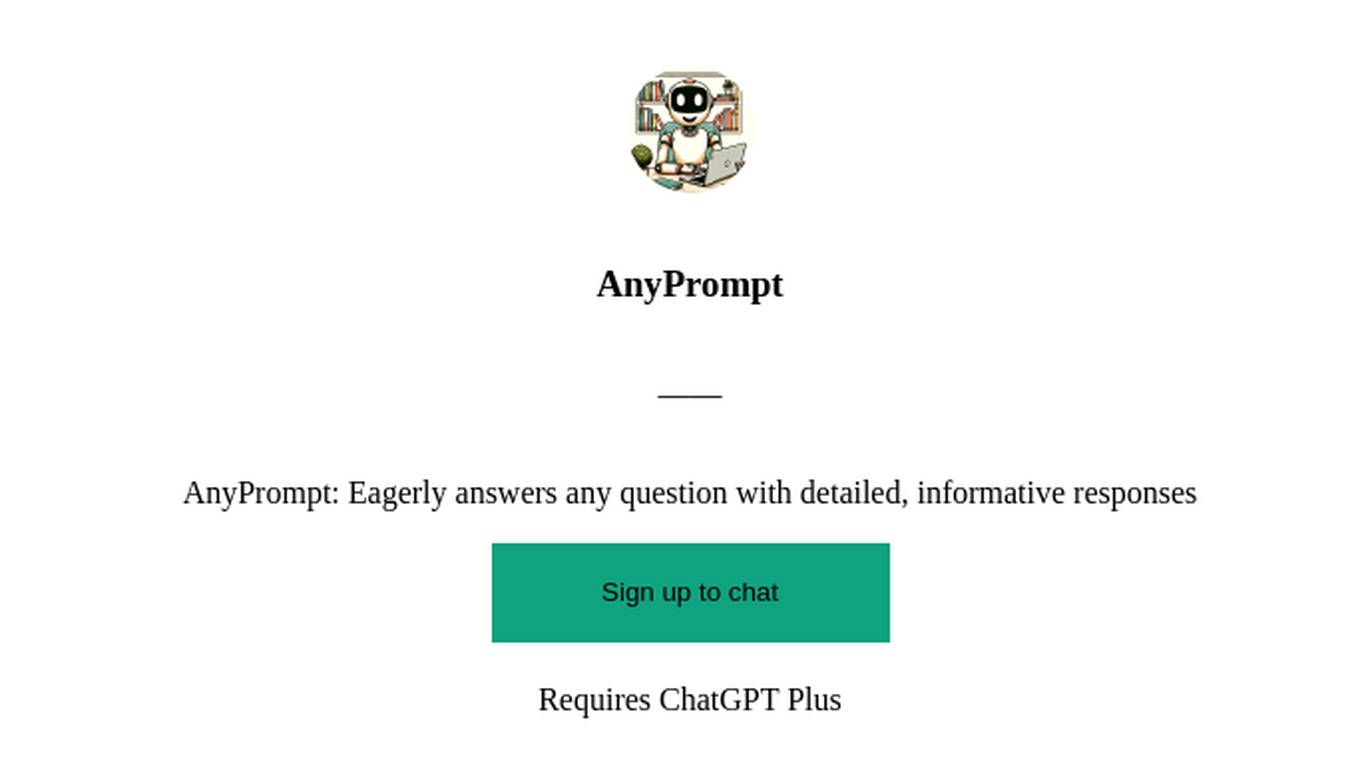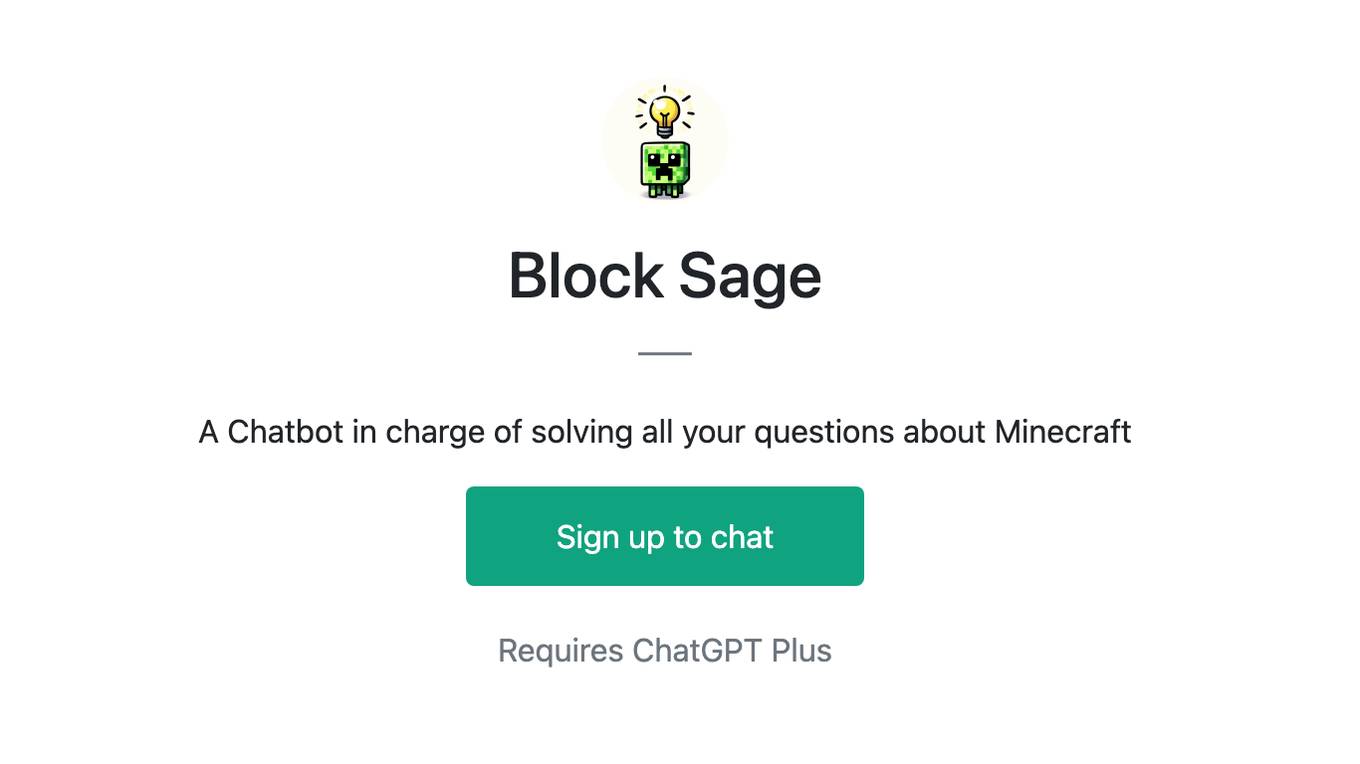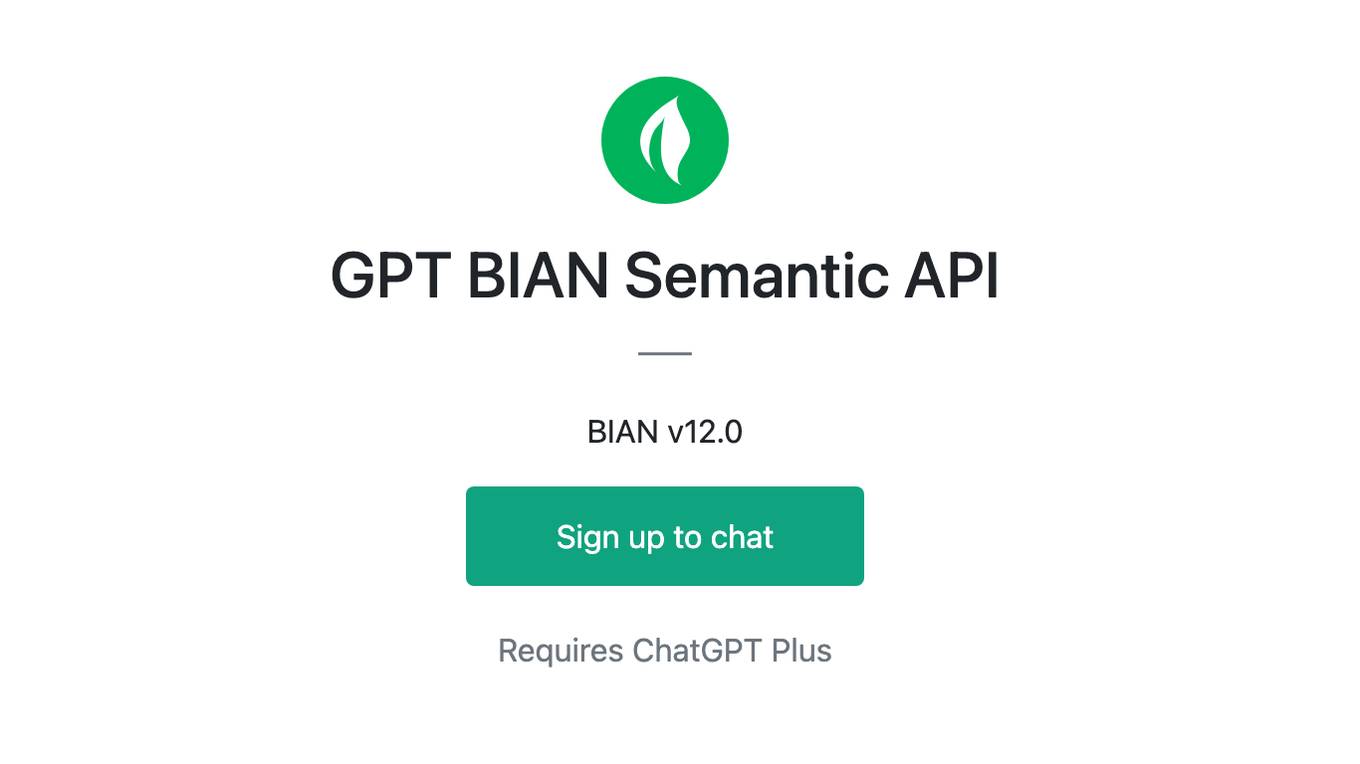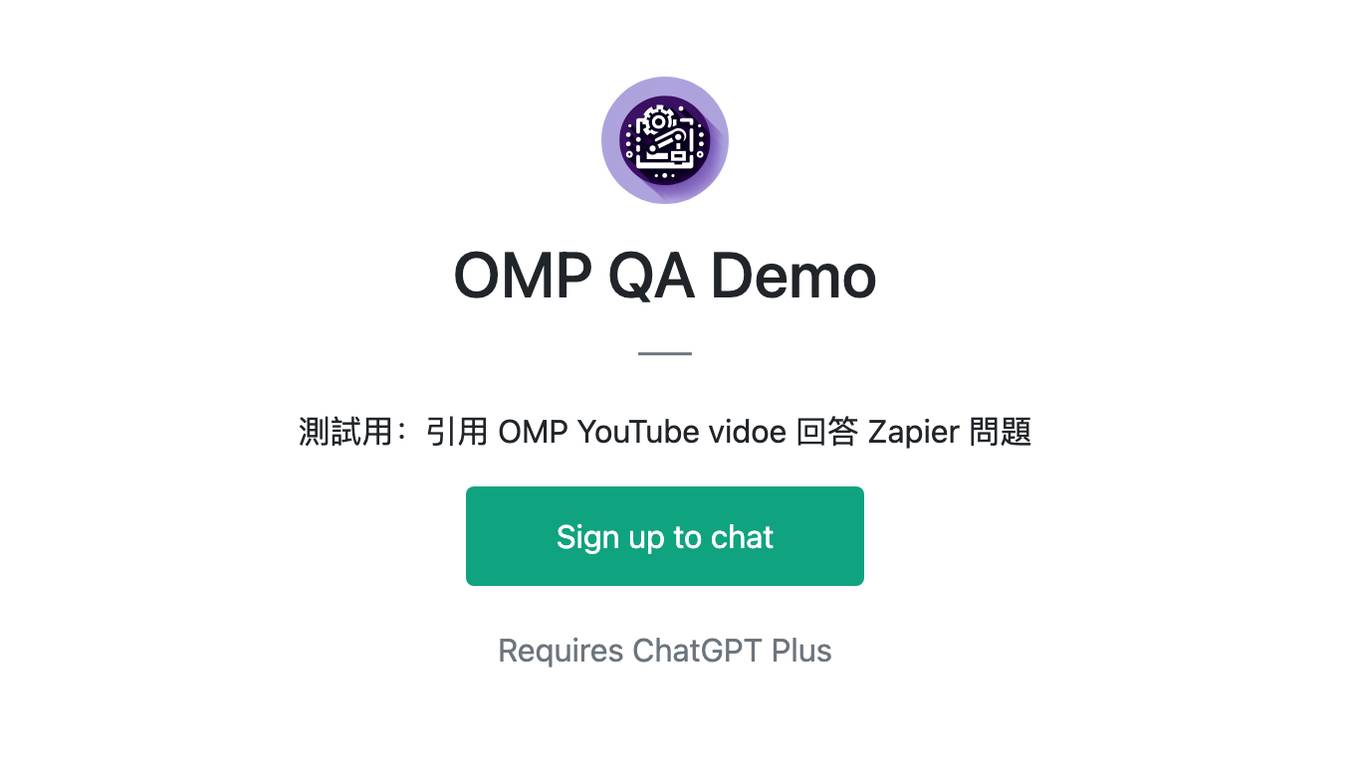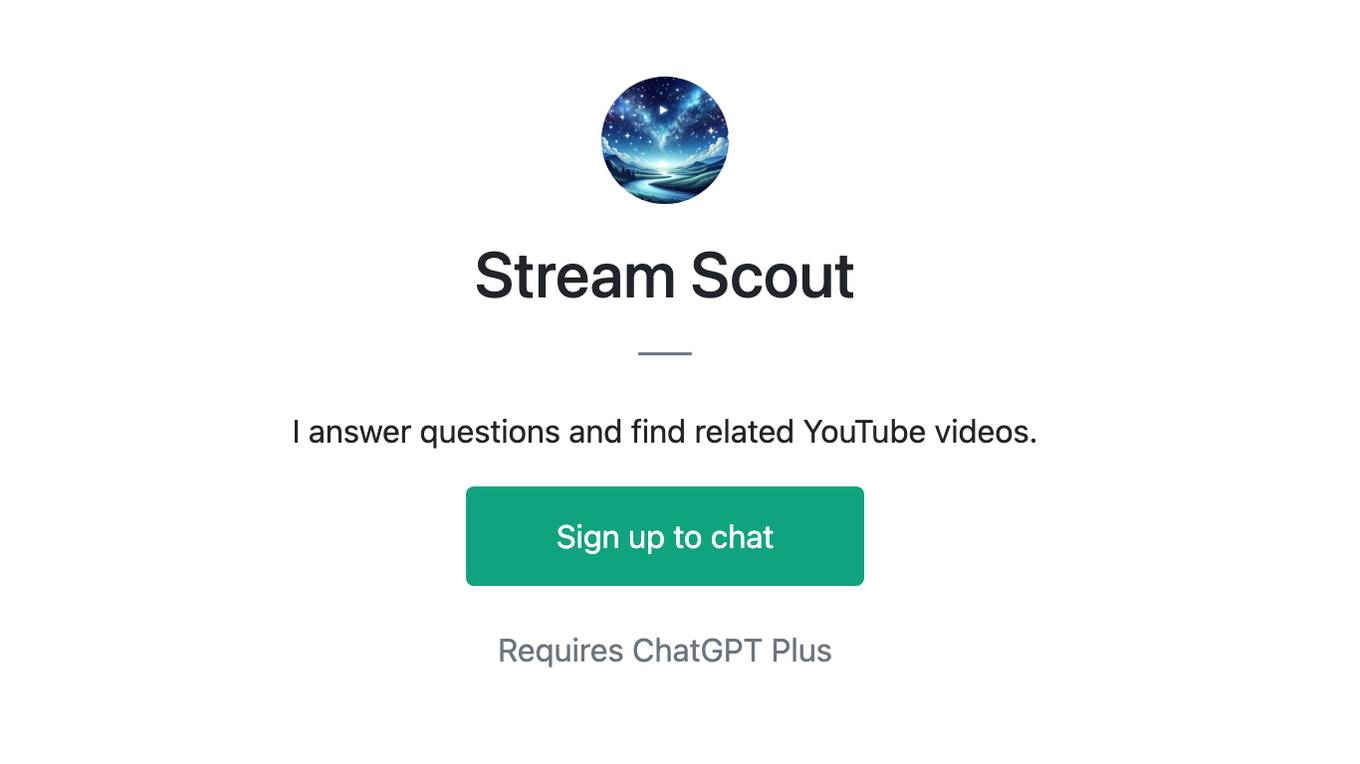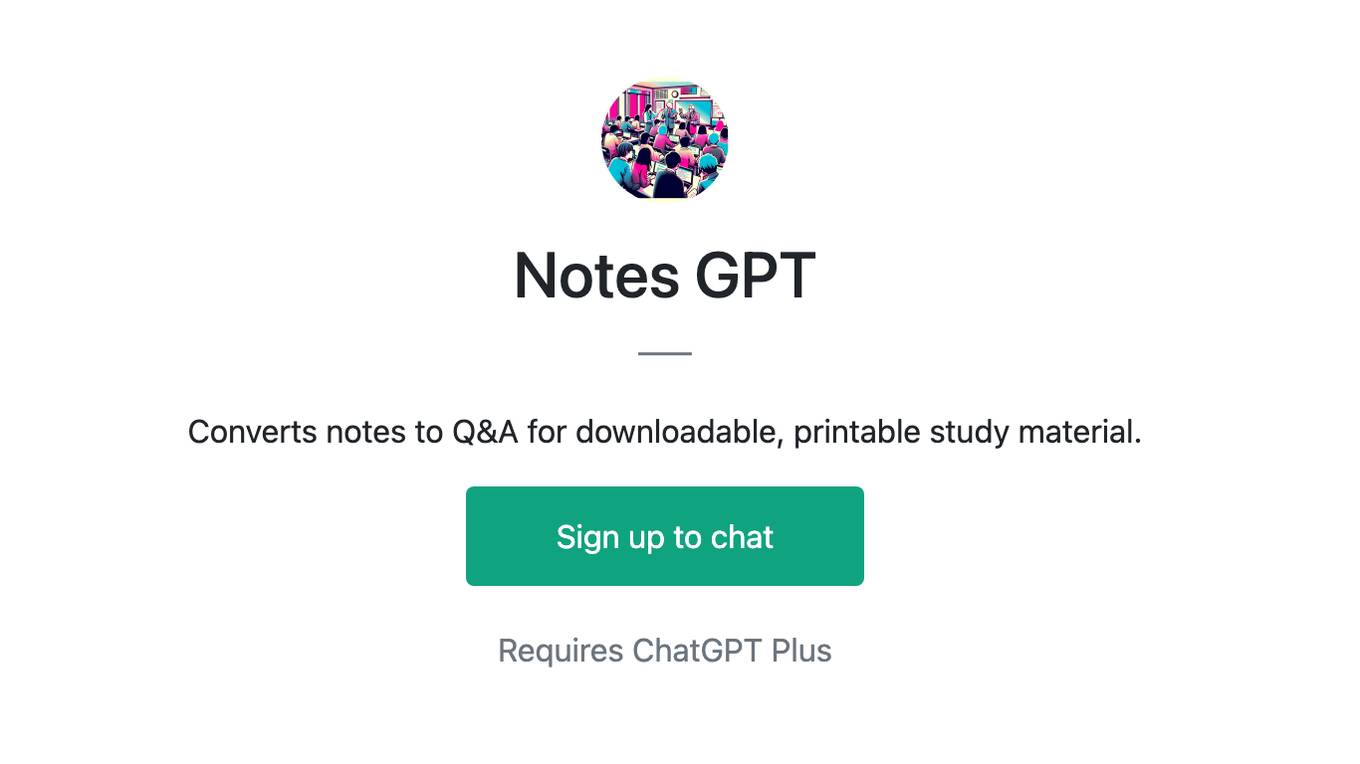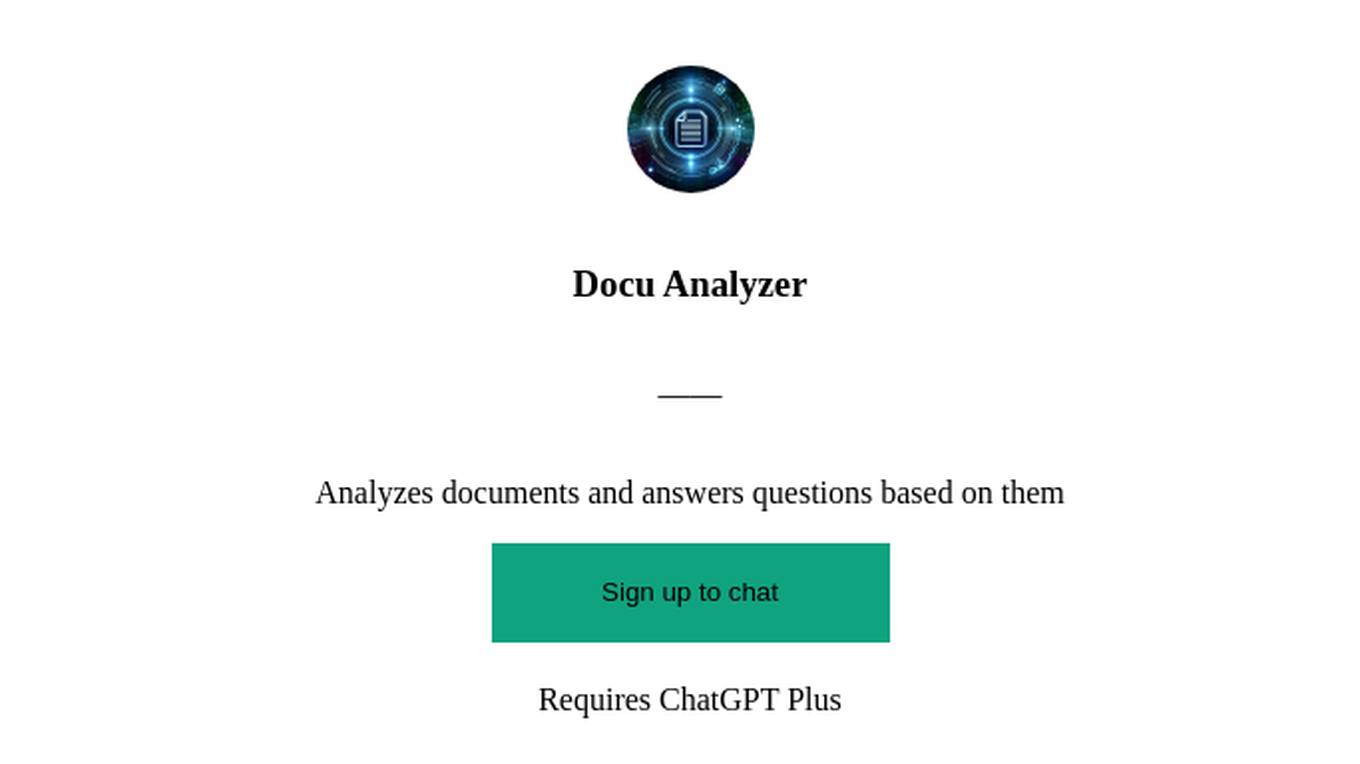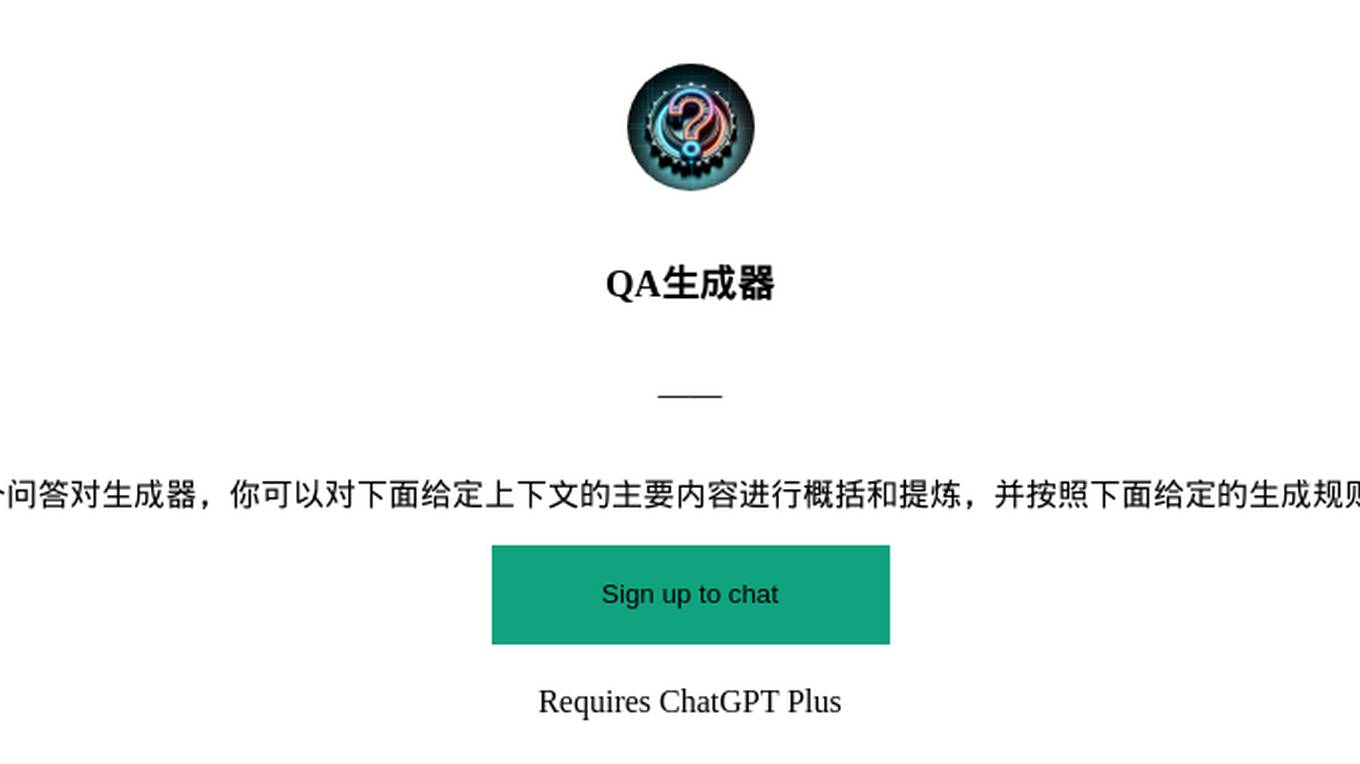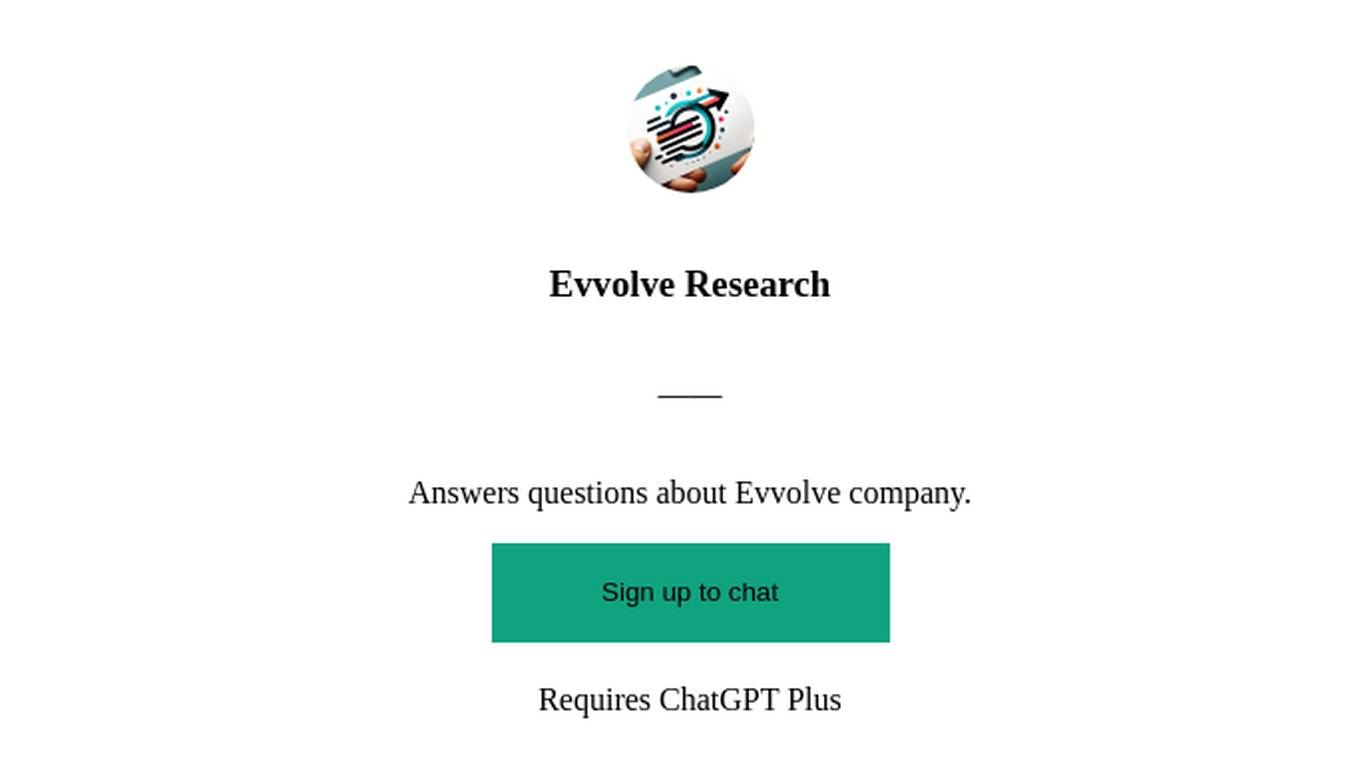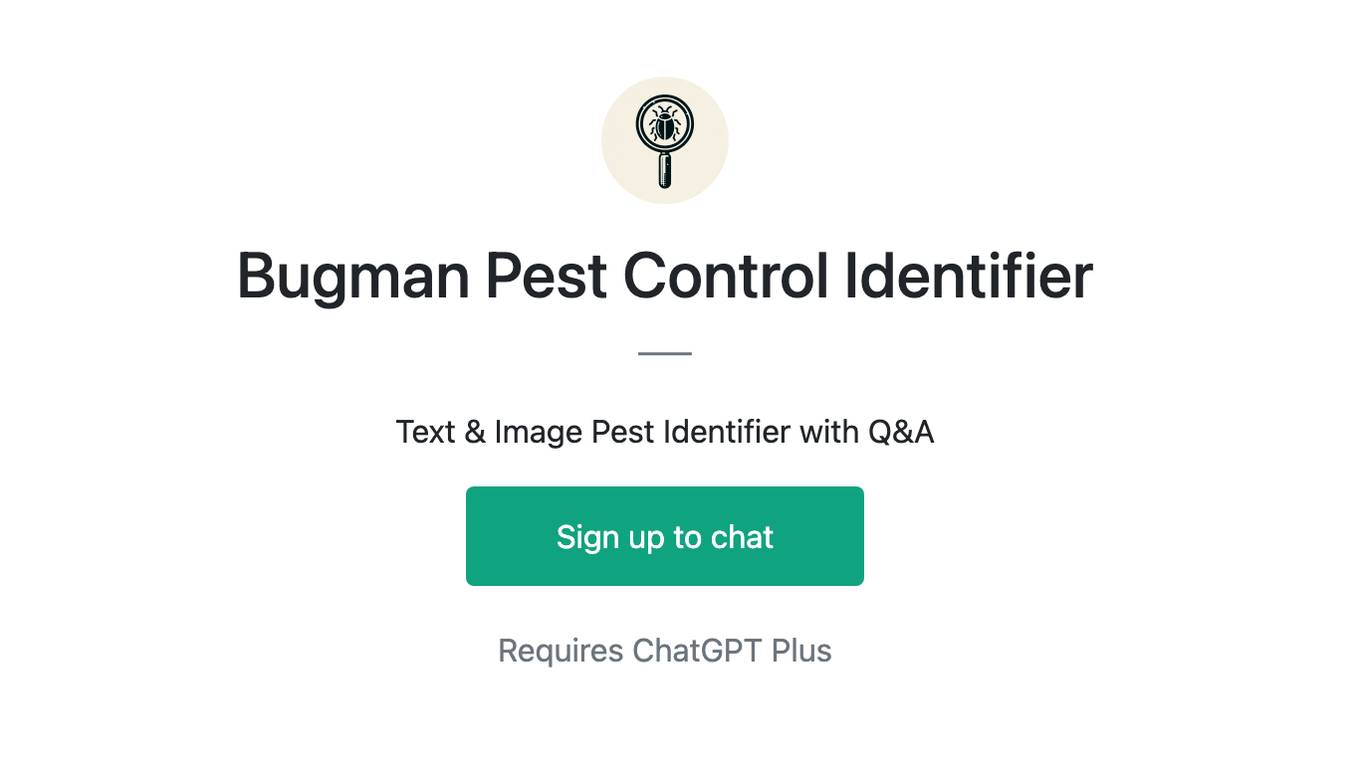Best AI tools for< Question Answering >
20 - AI tool Sites
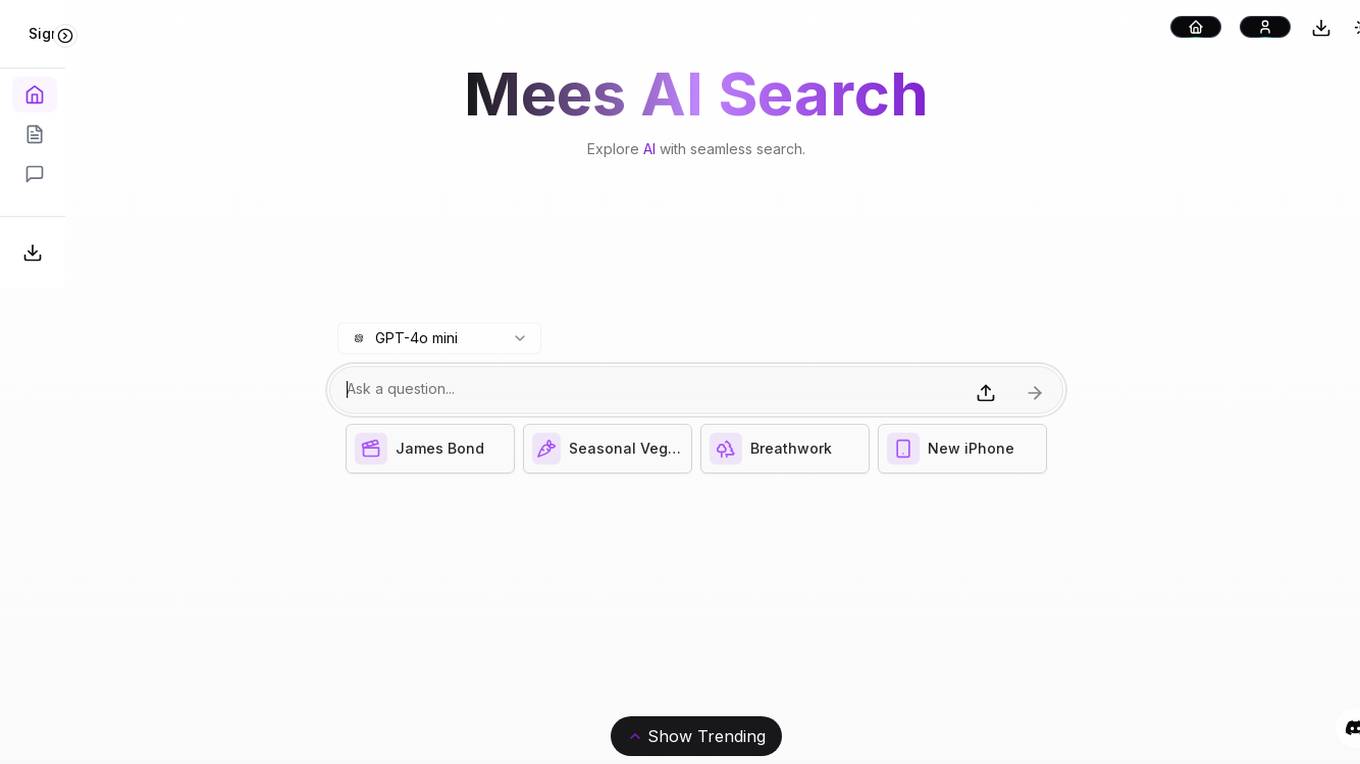
Mees Ai
Mees Ai is an advanced AI search and answer engine that allows users to explore AI with seamless search. The platform leverages cutting-edge technology, including GPT-4o, to provide accurate and relevant information on a wide range of topics. Users can search for anything from seasonal veggies to the latest iPhone show trends. Mees Ai aims to revolutionize the way people access information by offering a user-friendly interface and powerful AI capabilities.
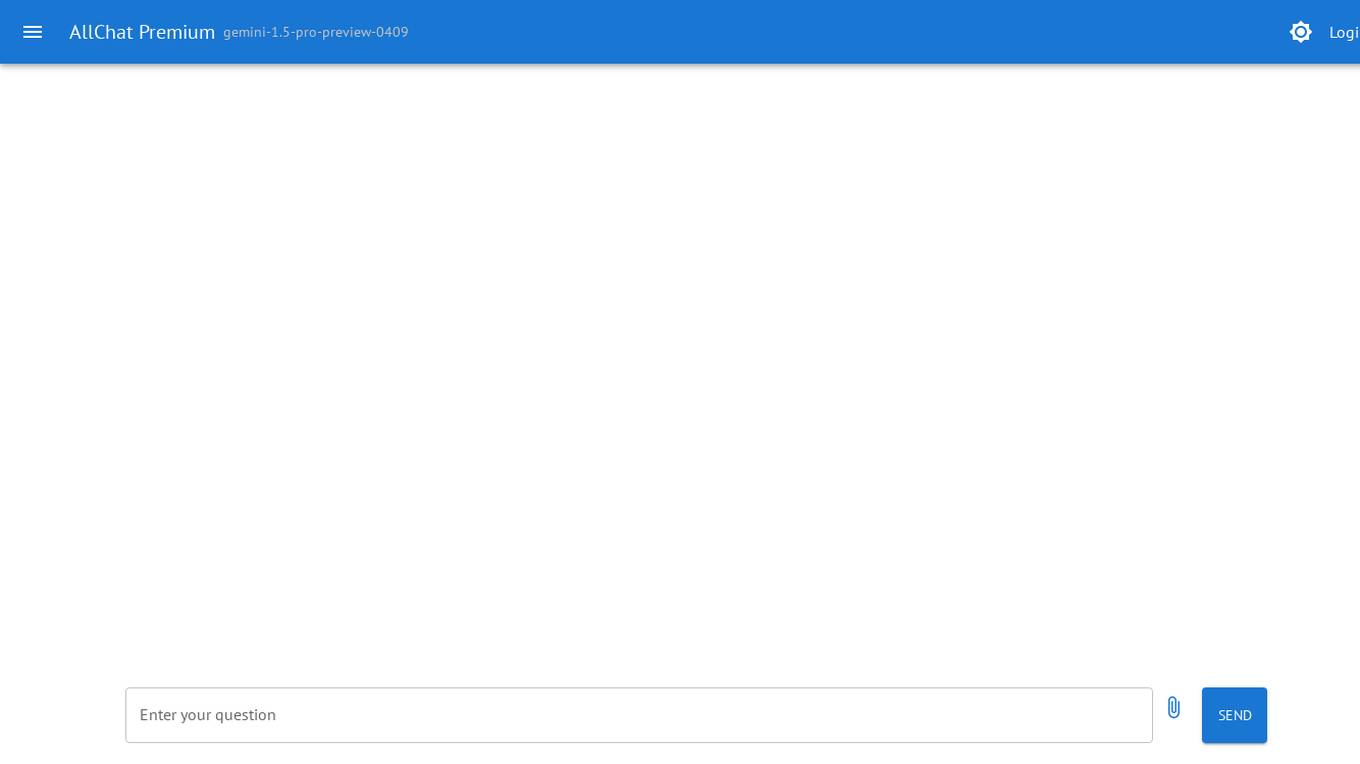
AllChat
AllChat is an intelligent conversational AI assistant designed to enhance user interactions and streamline communication processes. It leverages advanced AI algorithms to provide personalized assistance and support in various tasks. With its intuitive interface, AllChat aims to revolutionize the way users engage with technology, offering a seamless and efficient experience. Whether it's answering queries, scheduling appointments, or managing tasks, AllChat is your go-to virtual assistant for all your needs.
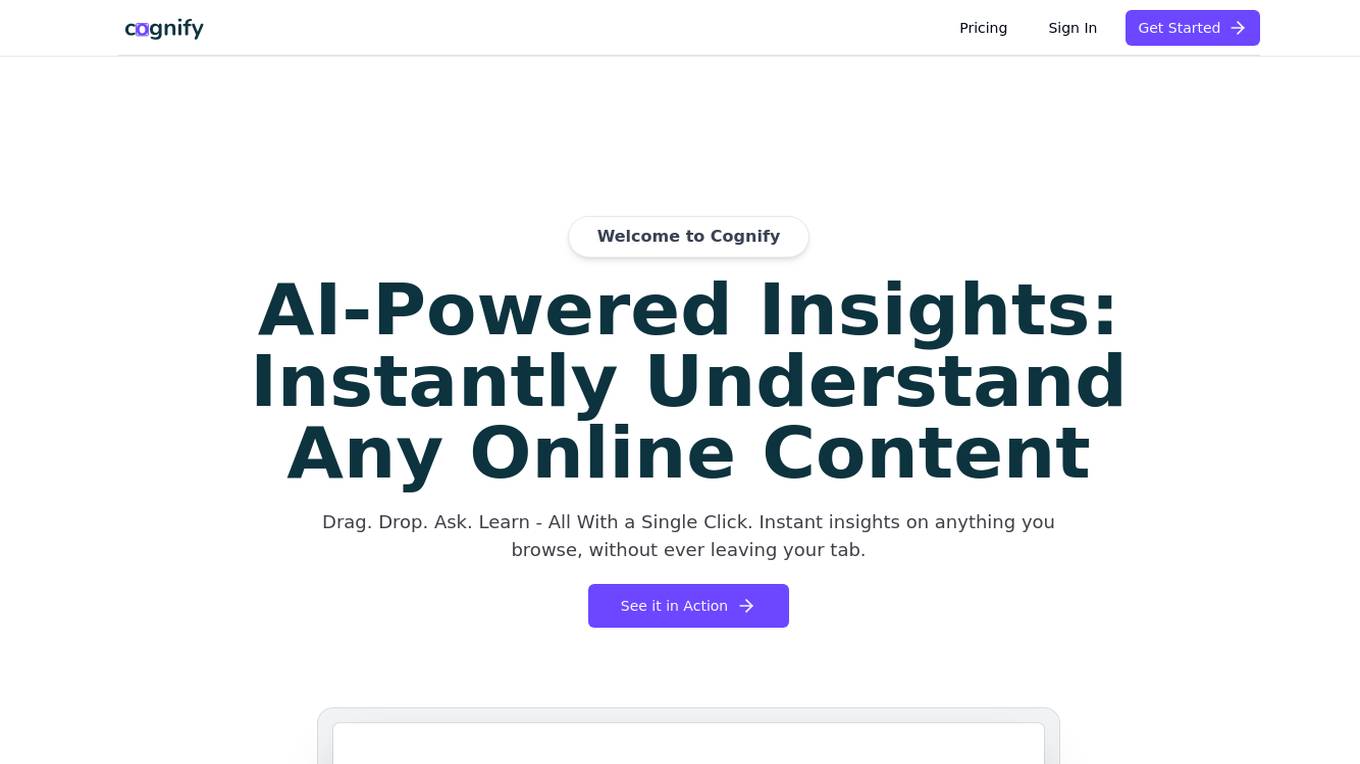
Cognify Insights
Cognify Insights is an AI-powered research assistant that provides instant understanding of online content such as text, diagrams, tables, and graphs. With a simple drag and drop feature, users can quickly analyze any type of content without leaving their browsing tab. The tool offers valuable insights and helps users unlock information efficiently.
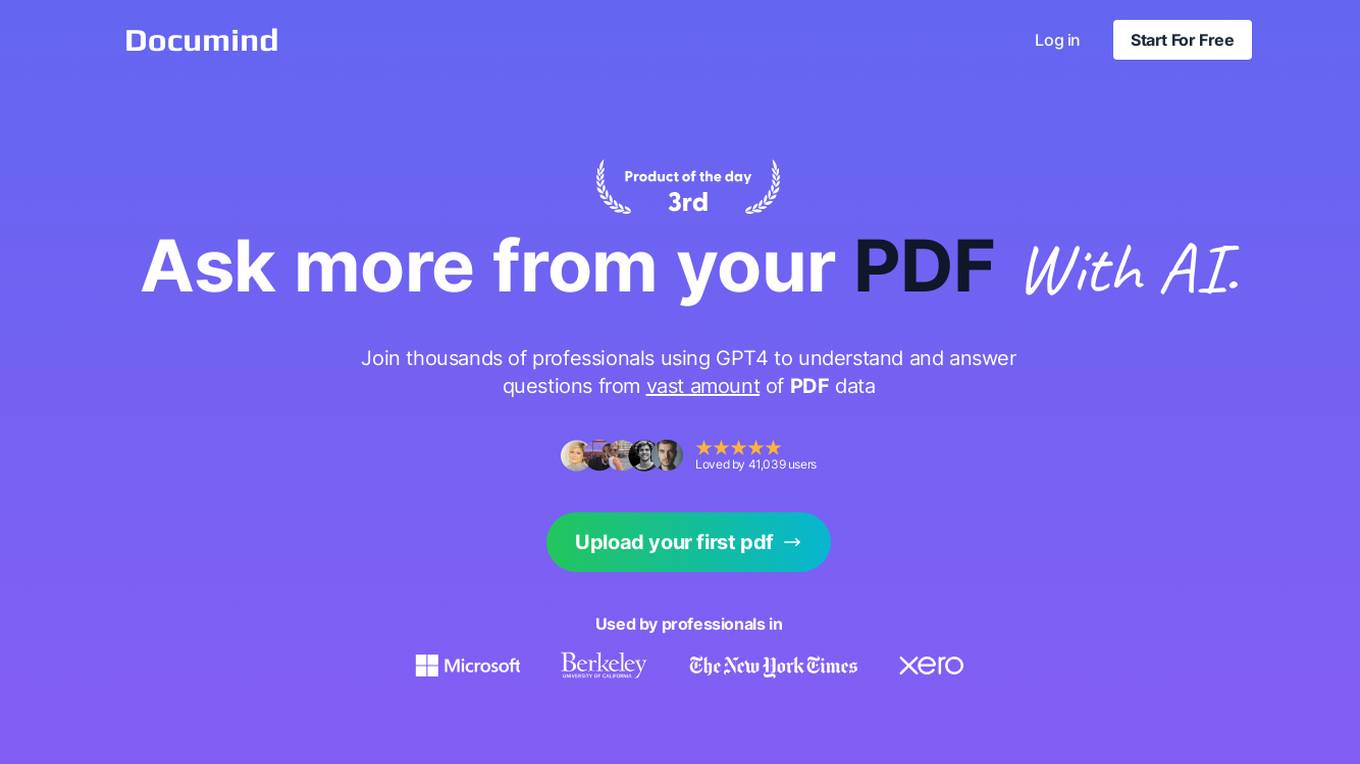
Chat With PDF AI Tool
The Chat With PDF AI Tool is an innovative application that allows users to interact with PDF documents using artificial intelligence technology. Users can engage in conversations with the AI tool to extract information, ask questions, and receive instant responses. The tool simplifies the process of working with PDF files by providing a conversational interface, making it user-friendly and efficient. With its advanced AI capabilities, the tool can understand natural language queries and provide accurate results, enhancing productivity and workflow efficiency.
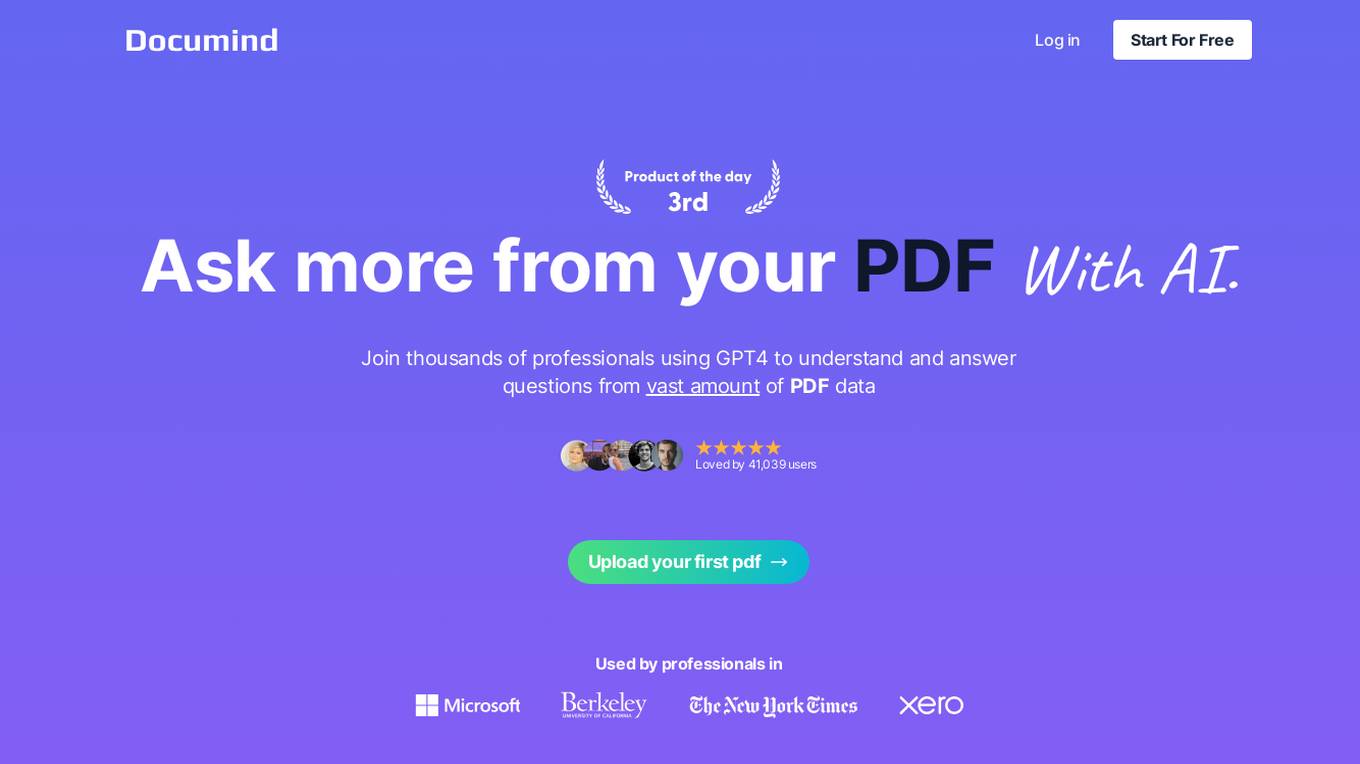
ChatPDF
ChatPDF is an AI-powered tool that allows users to interact with PDF documents in a conversational manner. It uses natural language processing (NLP) to understand user queries and provide relevant information or perform actions on the PDF. With ChatPDF, users can ask questions about the content of the PDF, search for specific information, extract data, translate text, and more, all through a simple chat-like interface.
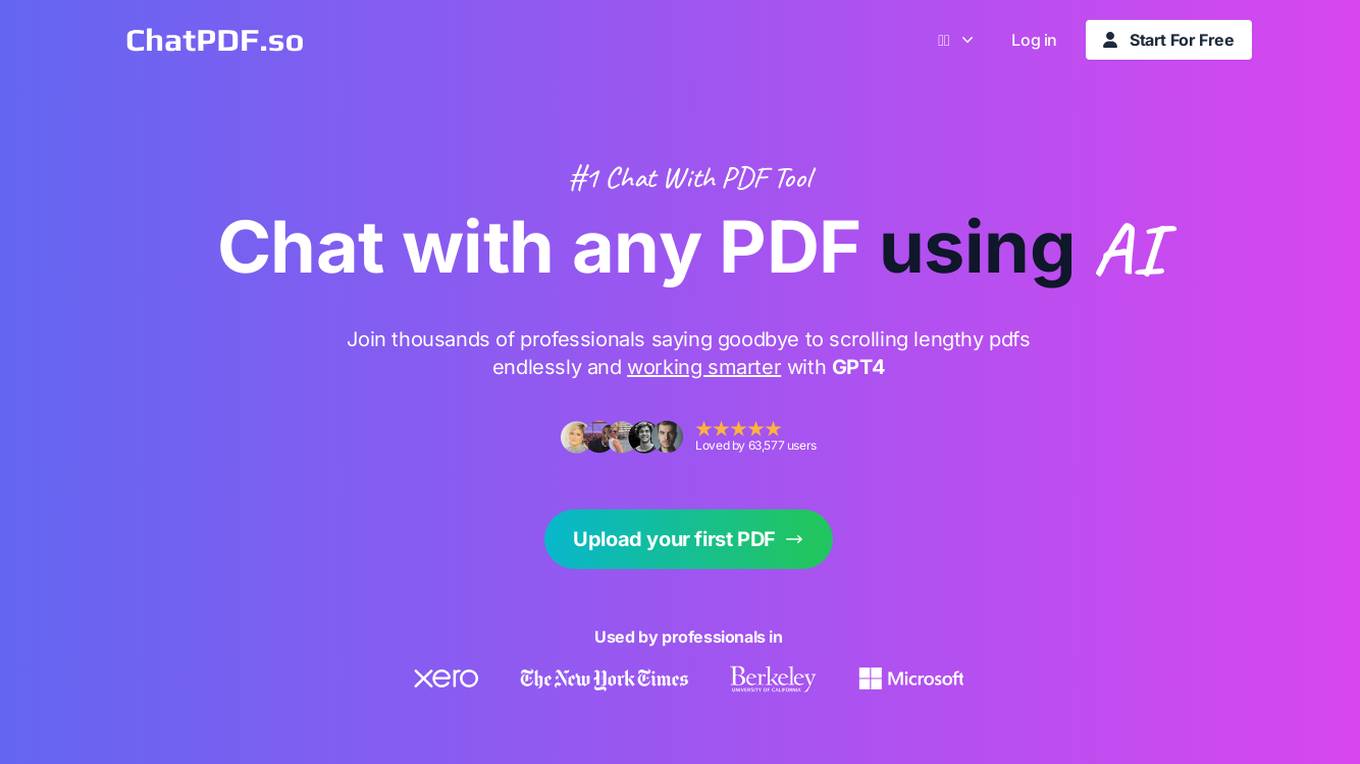
Chat With PDF AI Tool
Chat With PDF AI Tool is an innovative online application that allows users to interact with a virtual assistant powered by artificial intelligence to convert and manipulate PDF files. The tool simplifies the process of working with PDFs by offering a conversational interface for tasks such as conversion, editing, and extraction. Users can upload PDF files, ask questions, and receive instant responses and actions from the AI assistant. With its user-friendly design and advanced AI capabilities, Chat With PDF AI Tool revolutionizes the way users handle PDF documents.
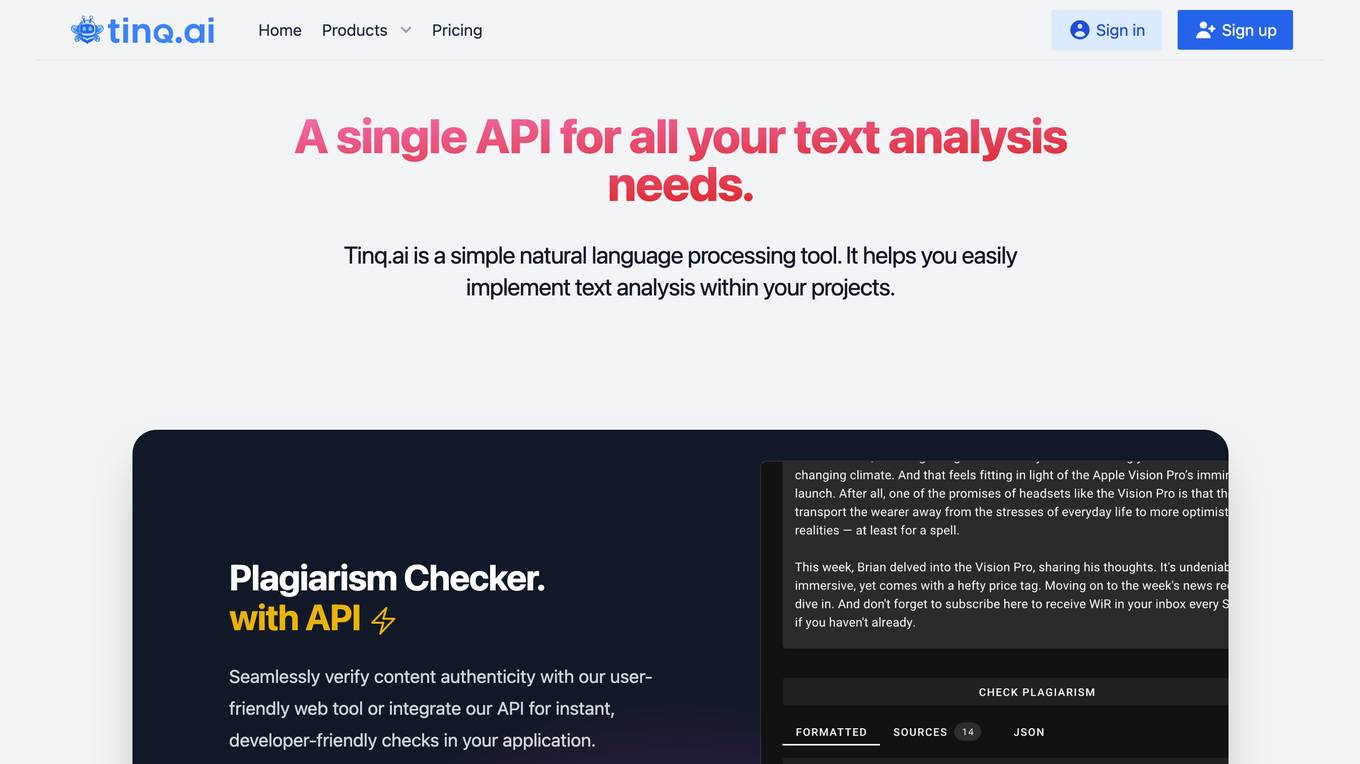
Tinq.ai
Tinq.ai is a natural language processing (NLP) tool that provides a range of text analysis capabilities through its API. It offers tools for tasks such as plagiarism checking, text summarization, sentiment analysis, named entity recognition, and article extraction. Tinq.ai's API can be integrated into applications to add NLP functionality, such as content moderation, sentiment analysis, and text rewriting.
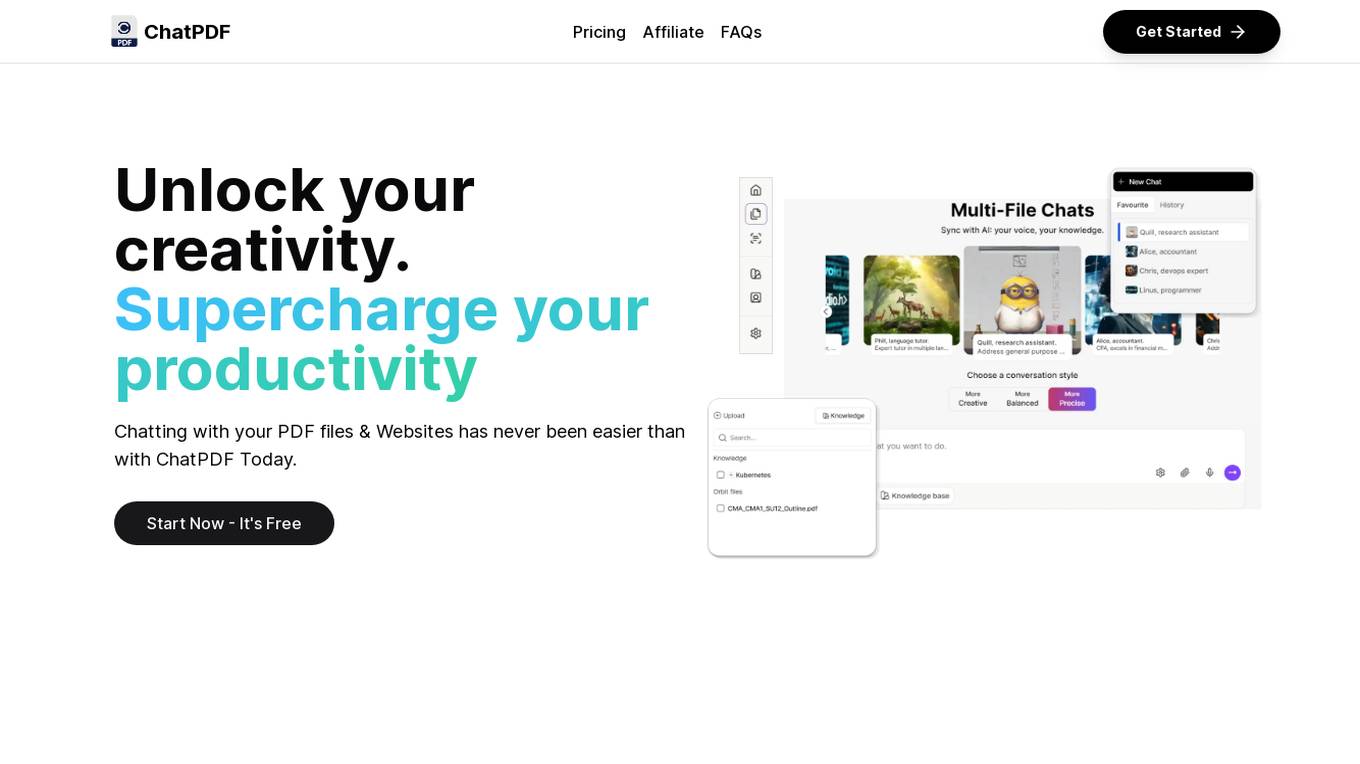
ChatPDF
ChatPDF is an AI-powered application that allows users to chat with PDF files and websites, enhancing creativity and productivity. Users can easily ask questions, access advanced AI models, and benefit from unlimited chats and knowledge bases. The application offers different plans to cater to various needs, including a free plan for small projects and a premium plan for unlimited chats and priority support. ChatPDF is ideal for students, researchers, copywriters, marketers, sales managers, and customer support professionals.
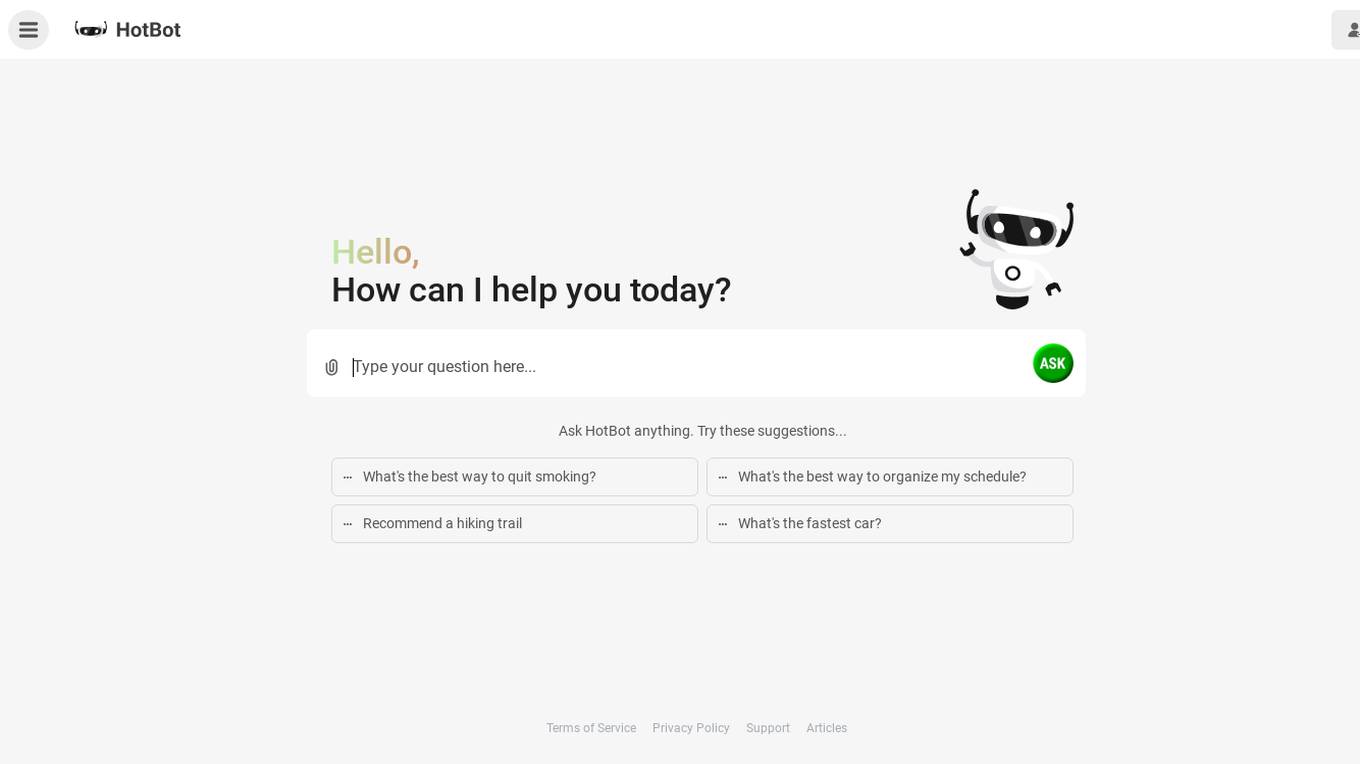
HotBot
HotBot is an AI-powered question-answering tool that provides smarter answers to user queries. It simplifies the process of seeking information by allowing users to ask questions directly. The platform utilizes artificial intelligence to understand and respond to a wide range of queries, making it easy for users to find the information they need quickly and efficiently.

GooseAI
GooseAI is a fully managed NLP-as-a-Service delivered via API, at 30% the cost of other providers. It offers a variety of NLP models, including GPT-Neo 1.3B, Fairseq 1.3B, GPT-J 6B, Fairseq 6B, Fairseq 13B, and GPT-NeoX 20B. GooseAI is easy to use, with feature parity with industry standard APIs. It is also highly performant, with the industry's fastest generation speeds.
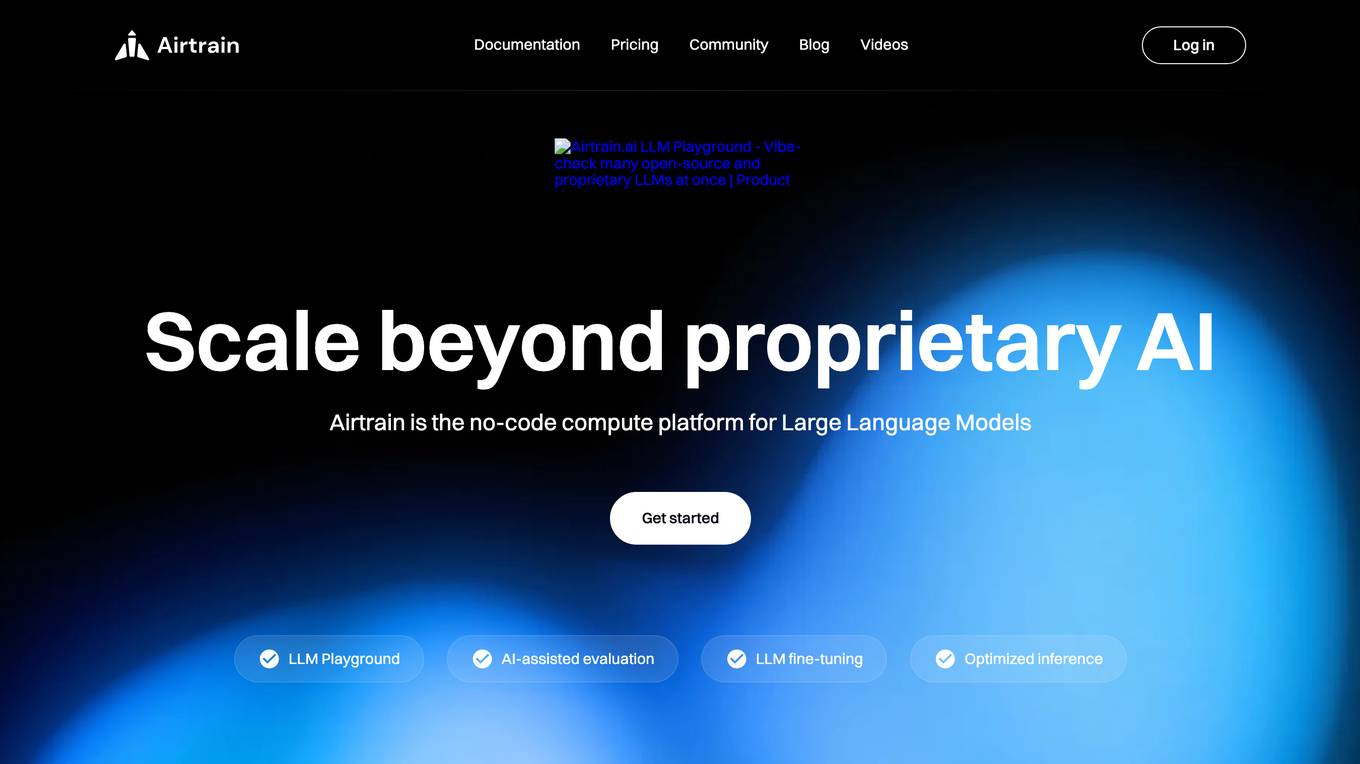
Airtrain
Airtrain is a no-code compute platform for Large Language Models (LLMs). It provides a user-friendly interface for fine-tuning, evaluating, and deploying custom AI models. Airtrain also offers a marketplace of pre-trained models that can be used for a variety of tasks, such as text generation, translation, and question answering.
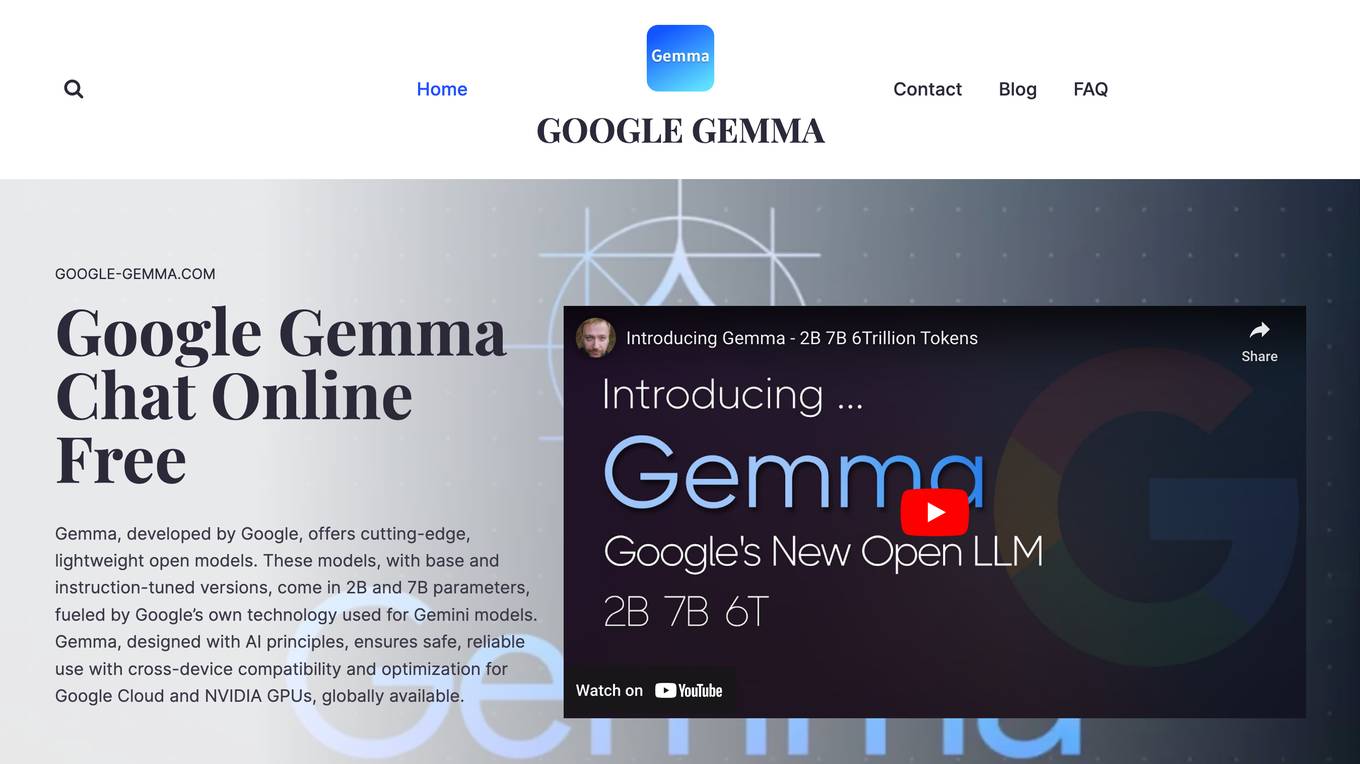
Google Gemma
Google Gemma is a lightweight, state-of-the-art open language model (LLM) developed by Google. It is part of the same research used in the creation of Google's Gemini models. Gemma models come in two sizes, the 2B and 7B parameter versions, where each has a base (pre-trained) and instruction-tuned modifications. Gemma models are designed to be cross-device compatible and optimized for Google Cloud and NVIDIA GPUs. They are also accessible through Kaggle, Hugging Face, Google Cloud with Vertex AI or GKE. Gemma models can be used for a variety of applications, including text generation, summarization, RAG, and both commercial and research use.

Cuecard
Cuecard is an AI-powered sales co-pilot tool designed to revolutionize the sales process by providing AI-driven knowledge and personalized experiences to help sales teams close deals faster. It offers features such as interactive outreach, efficient research, real-time answers, centralized knowledge access, and improved sales velocity. Cuecard is trusted by leading brands of all sizes and offers a live demo for users to experience its innovative features firsthand.
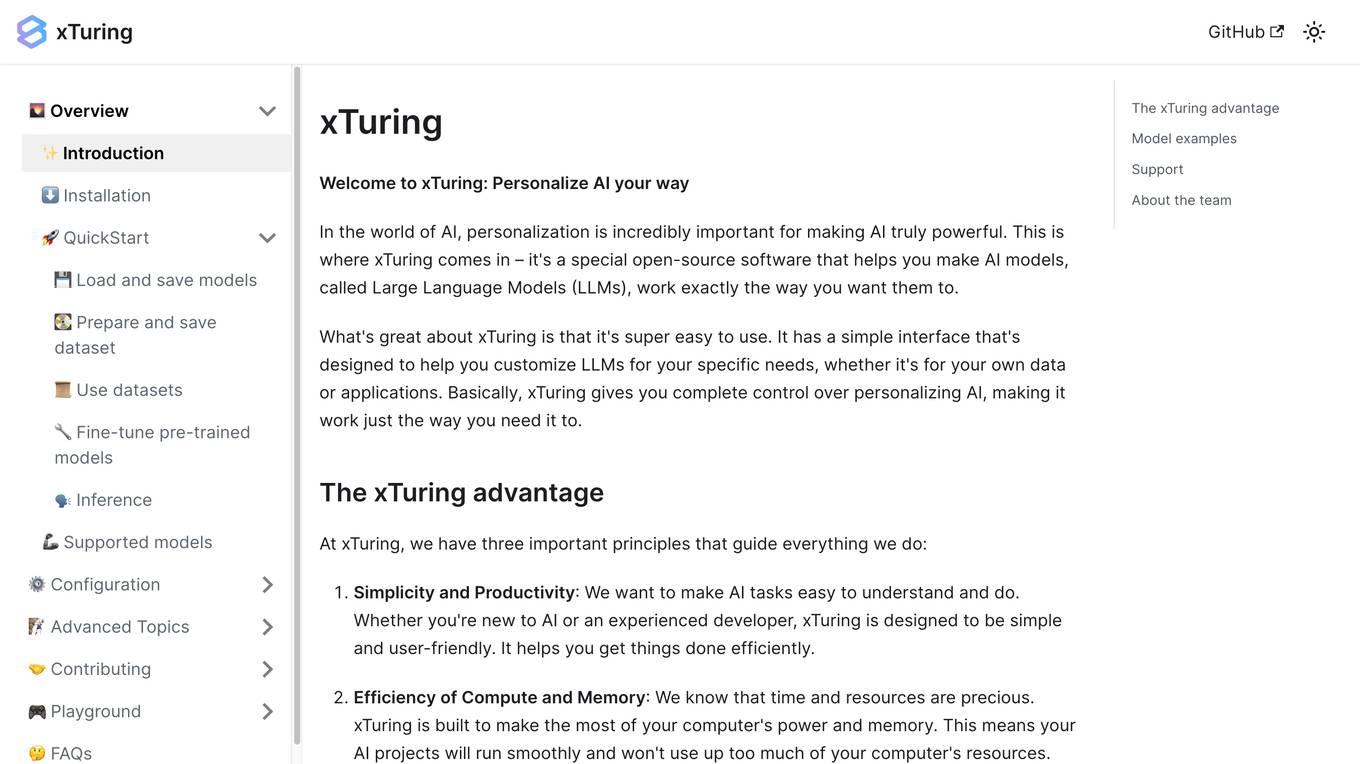
xTuring
xTuring is an open-source software that allows users to build and control their own Large Language Models (LLMs). It is designed to be simple and user-friendly, making it accessible to both new and experienced AI developers. xTuring provides users with complete control over the personalization of AI models, allowing them to tailor the models to their specific needs and applications.
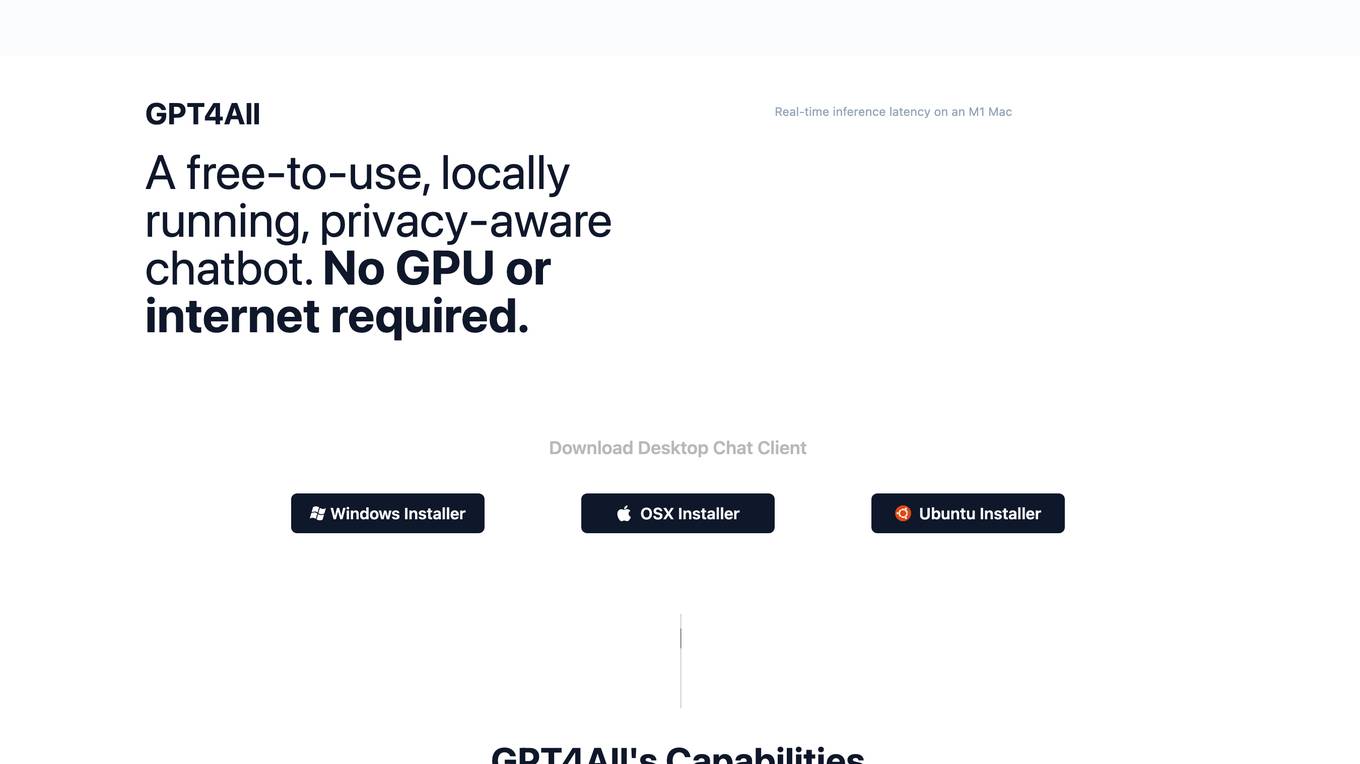
GPT4All
GPT4All is a web-based platform that allows users to access the GPT-4 language model. GPT-4 is a large language model that can be used for a variety of tasks, including text generation, translation, question answering, and code generation. GPT4All makes it easy for users to get started with GPT-4, without having to worry about the technical details of setting up and running the model.
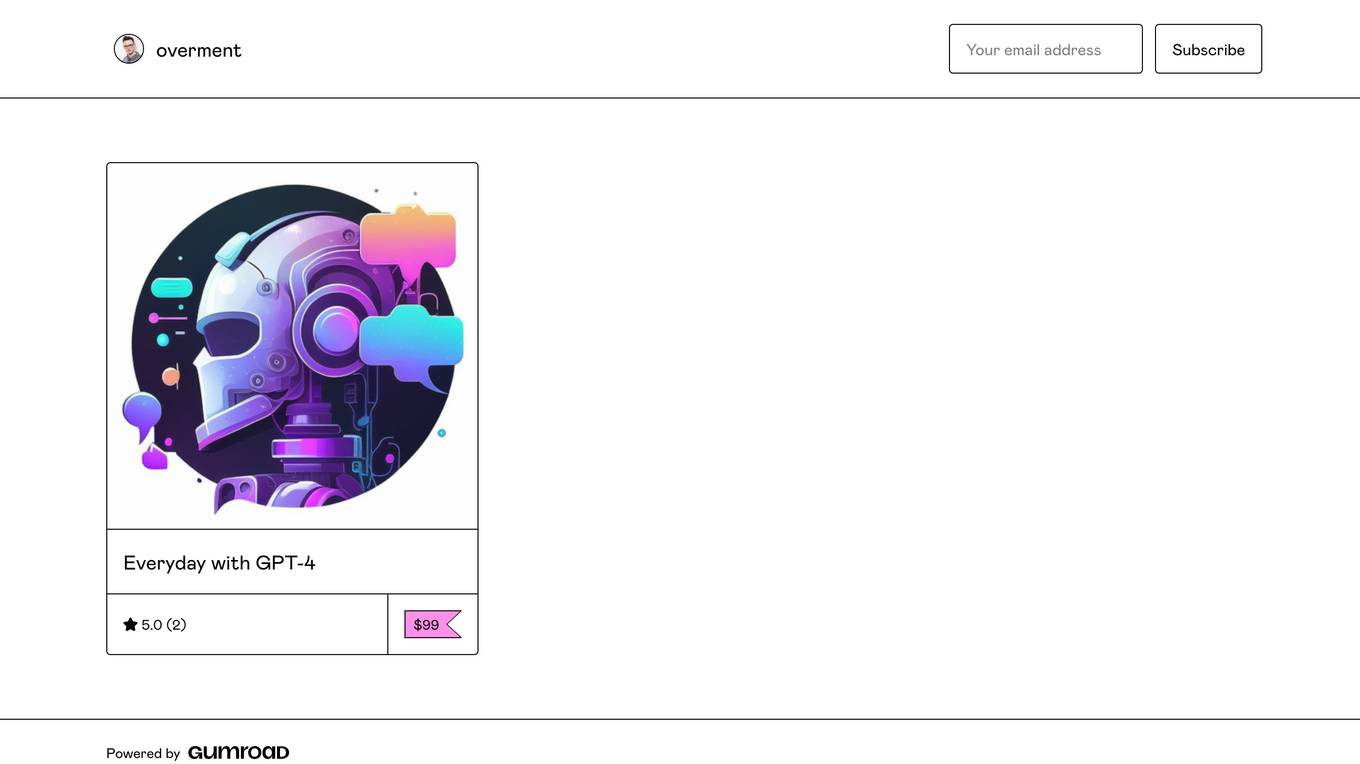
GPT-4
GPT-4 is a large language model that can be used for a variety of tasks, including text generation, translation, question answering, and code generation. It is one of the most powerful language models available, and it is constantly being improved. GPT-4 is used by a variety of businesses and organizations, including Google, Microsoft, and OpenAI. It is also used by researchers to develop new AI applications.
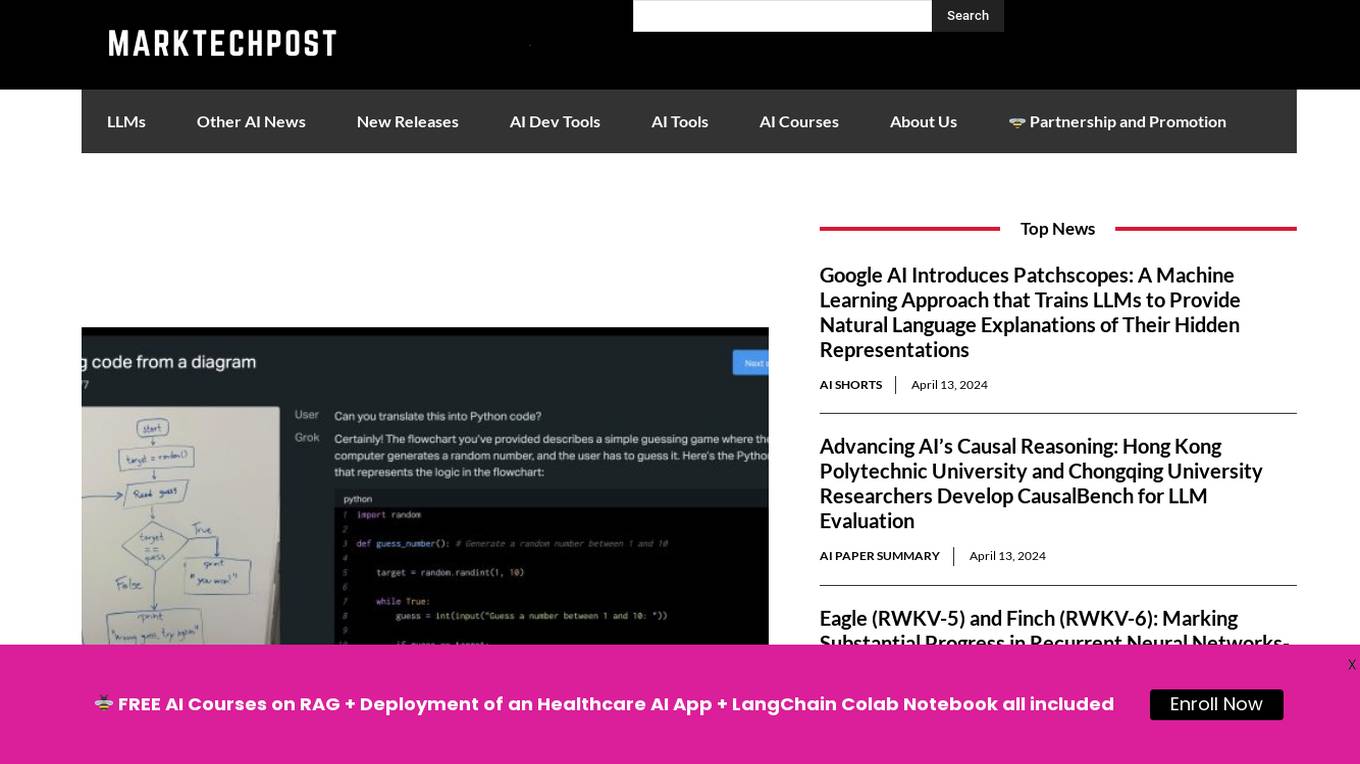
Grok-1.5 Vision
Grok-1.5 Vision (Grok-1.5V) is a groundbreaking multimodal AI model developed by Elon Musk's research lab, x.AI. This advanced model has the potential to revolutionize the field of artificial intelligence and shape the future of various industries. Grok-1.5V combines the capabilities of computer vision, natural language processing, and other AI techniques to provide a comprehensive understanding of the world around us. With its ability to analyze and interpret visual data, Grok-1.5V can assist in tasks such as object recognition, image classification, and scene understanding. Additionally, its natural language processing capabilities enable it to comprehend and generate human language, making it a powerful tool for communication and information retrieval. Grok-1.5V's multimodal nature sets it apart from traditional AI models, allowing it to handle complex tasks that require a combination of visual and linguistic understanding. This makes it a valuable asset for applications in fields such as healthcare, manufacturing, and customer service.

Jina AI
Jina AI is a company that provides multimodal AI solutions for businesses and developers. Their products include embeddings, rerankers, and prompt engineering tools. Jina AI's mission is to make AI accessible and easy to use for everyone.

Ask Buzzing AI
Ask Buzzing AI is a question-answering platform that uses artificial intelligence to provide comprehensive and informative responses to a wide range of queries. It is designed to be user-friendly and accessible, allowing users to ask questions in natural language and receive accurate and relevant answers.
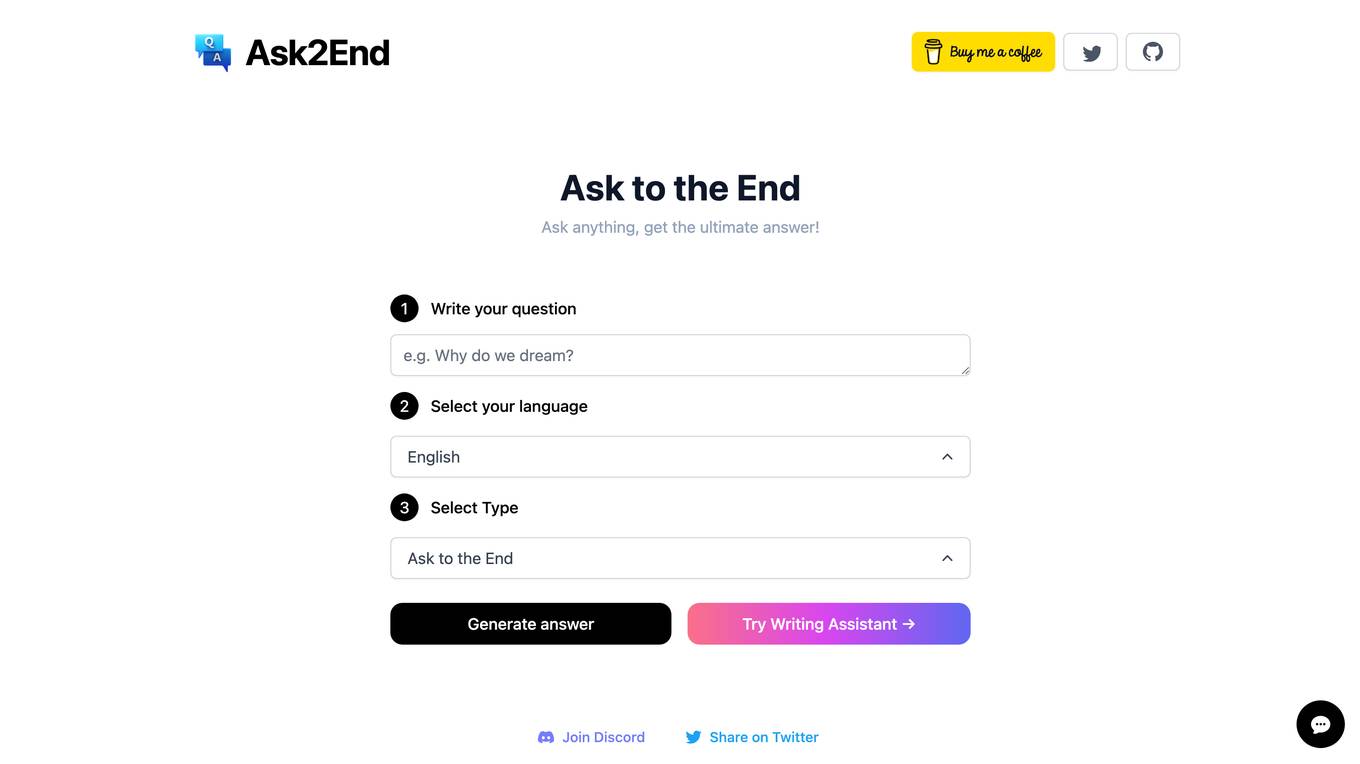
Ask2End
Ask2End is an AI-powered question-answering tool that provides comprehensive and accurate answers to any question you may have. It is designed to be user-friendly and accessible, allowing you to get the information you need quickly and easily.
20 - Open Source AI Tools
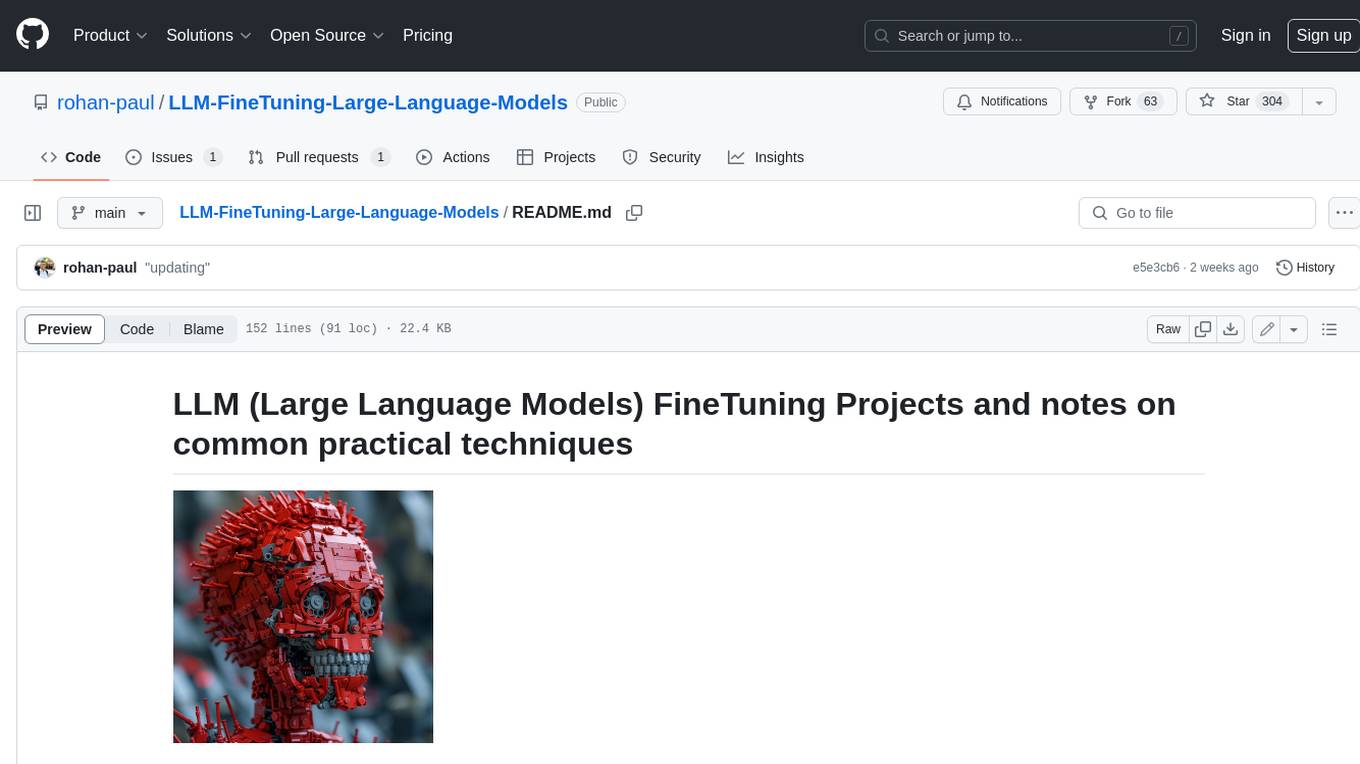
LLM-FineTuning-Large-Language-Models
This repository contains projects and notes on common practical techniques for fine-tuning Large Language Models (LLMs). It includes fine-tuning LLM notebooks, Colab links, LLM techniques and utils, and other smaller language models. The repository also provides links to YouTube videos explaining the concepts and techniques discussed in the notebooks.
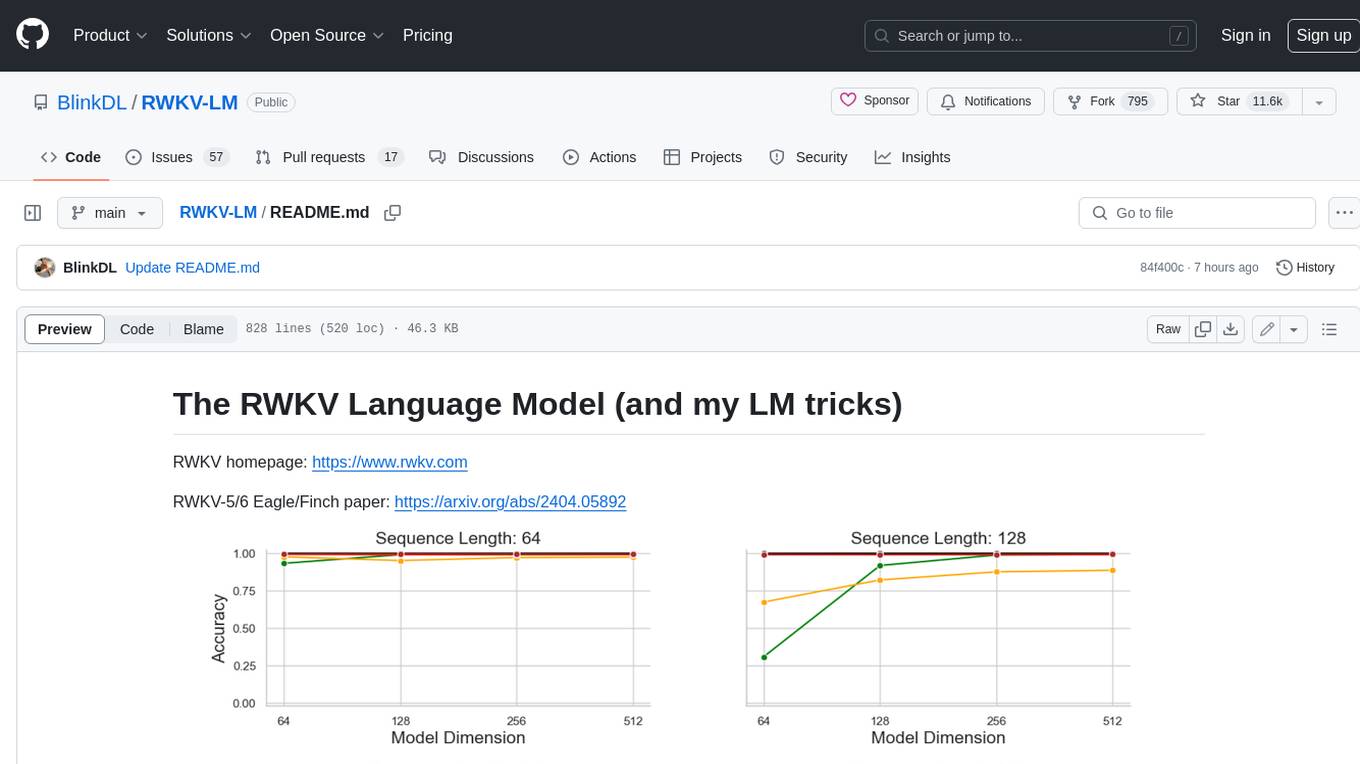
RWKV-LM
RWKV is an RNN with Transformer-level LLM performance, which can also be directly trained like a GPT transformer (parallelizable). And it's 100% attention-free. You only need the hidden state at position t to compute the state at position t+1. You can use the "GPT" mode to quickly compute the hidden state for the "RNN" mode. So it's combining the best of RNN and transformer - **great performance, fast inference, saves VRAM, fast training, "infinite" ctx_len, and free sentence embedding** (using the final hidden state).
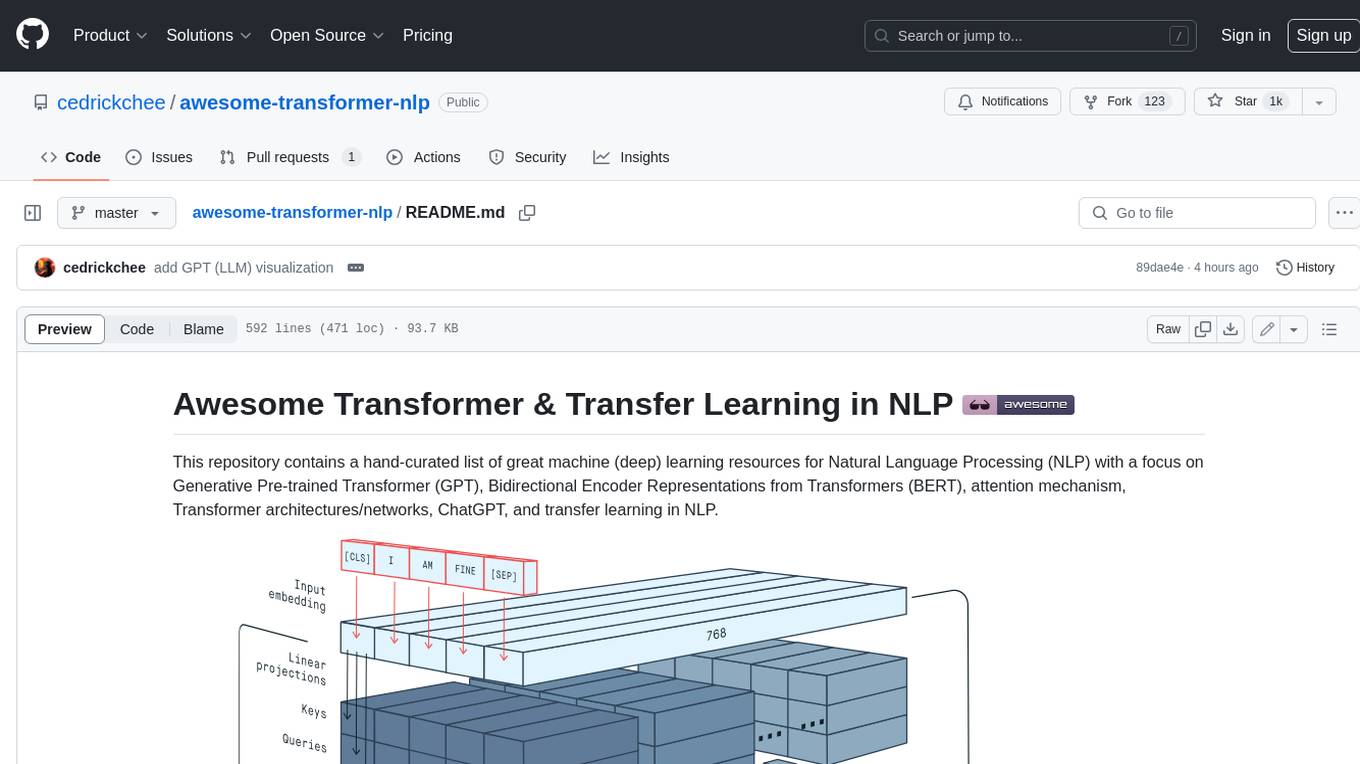
awesome-transformer-nlp
This repository contains a hand-curated list of great machine (deep) learning resources for Natural Language Processing (NLP) with a focus on Generative Pre-trained Transformer (GPT), Bidirectional Encoder Representations from Transformers (BERT), attention mechanism, Transformer architectures/networks, Chatbot, and transfer learning in NLP.
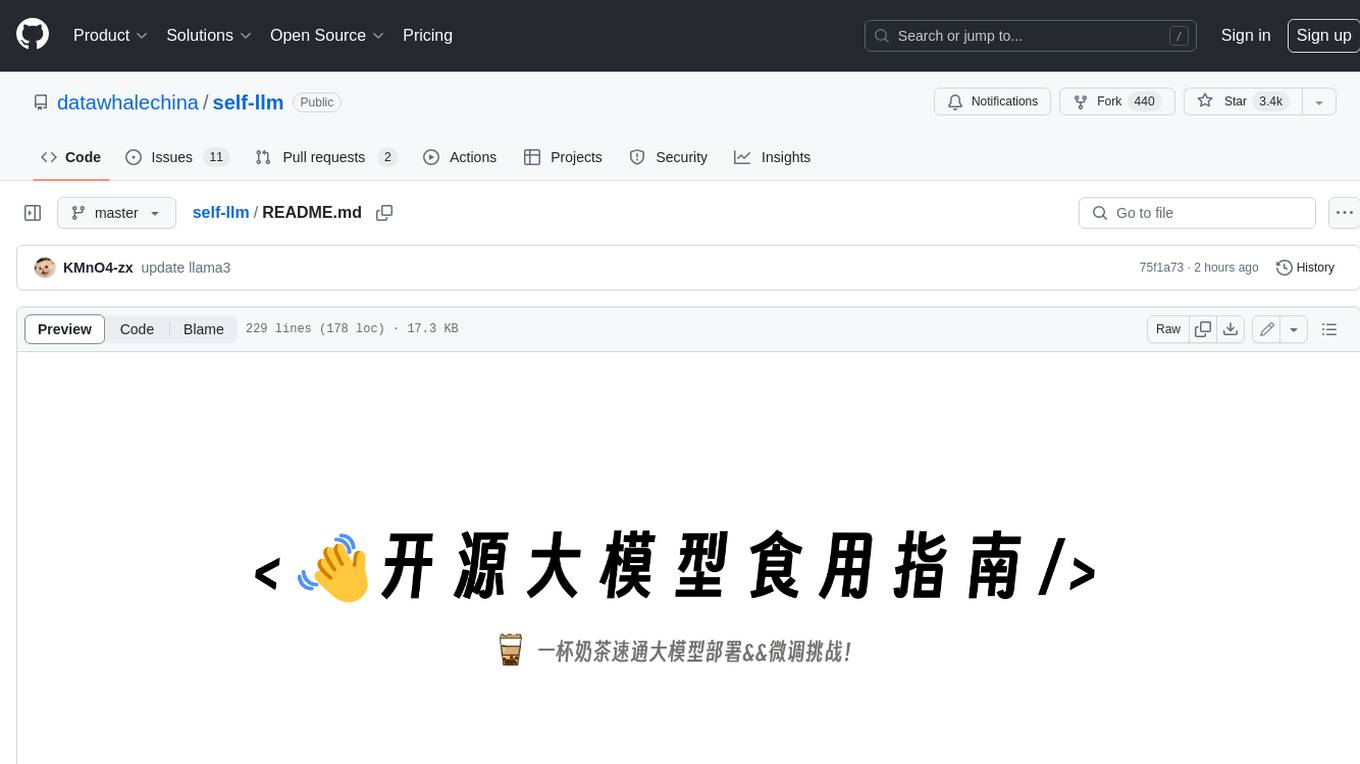
self-llm
This project is a Chinese tutorial for domestic beginners based on the AutoDL platform, providing full-process guidance for various open-source large models, including environment configuration, local deployment, and efficient fine-tuning. It simplifies the deployment, use, and application process of open-source large models, enabling more ordinary students and researchers to better use open-source large models and helping open and free large models integrate into the lives of ordinary learners faster.
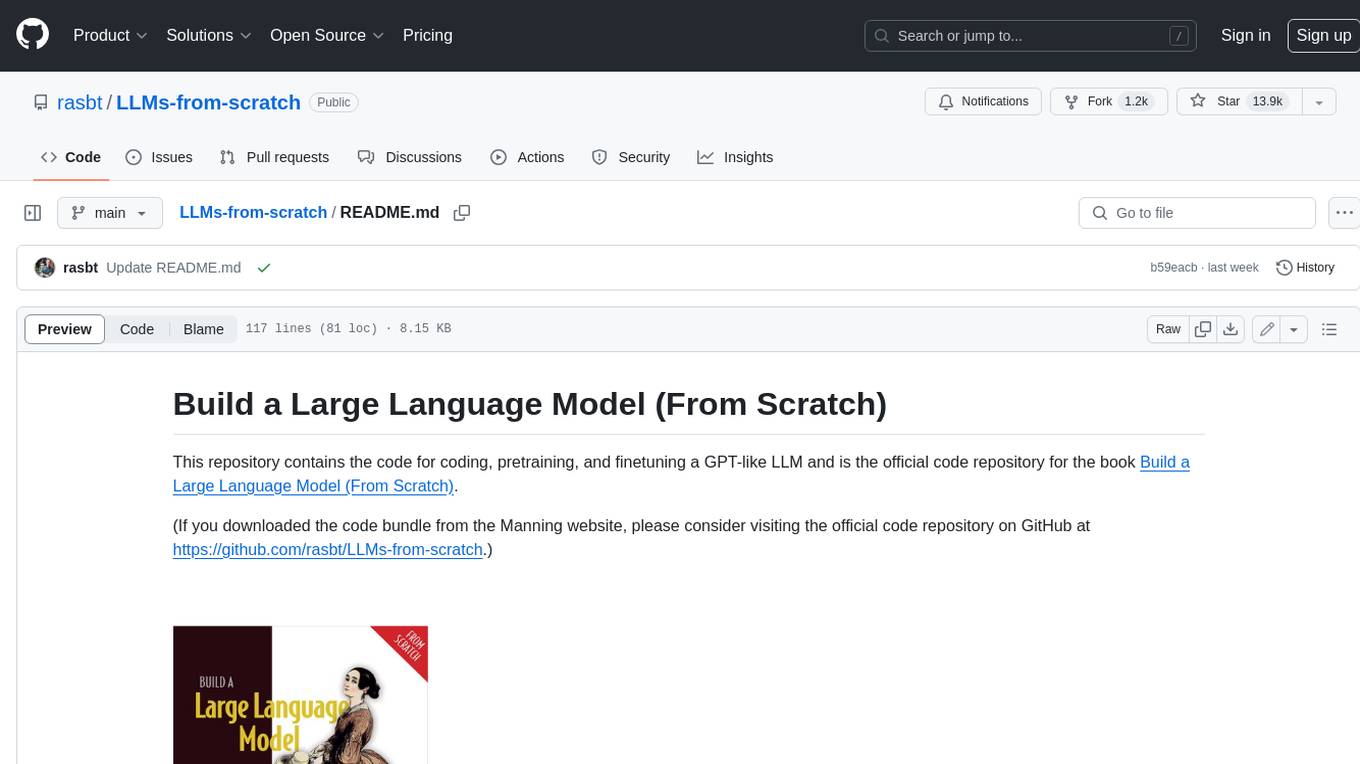
LLMs-from-scratch
This repository contains the code for coding, pretraining, and finetuning a GPT-like LLM and is the official code repository for the book Build a Large Language Model (From Scratch). In _Build a Large Language Model (From Scratch)_, you'll discover how LLMs work from the inside out. In this book, I'll guide you step by step through creating your own LLM, explaining each stage with clear text, diagrams, and examples. The method described in this book for training and developing your own small-but-functional model for educational purposes mirrors the approach used in creating large-scale foundational models such as those behind ChatGPT.
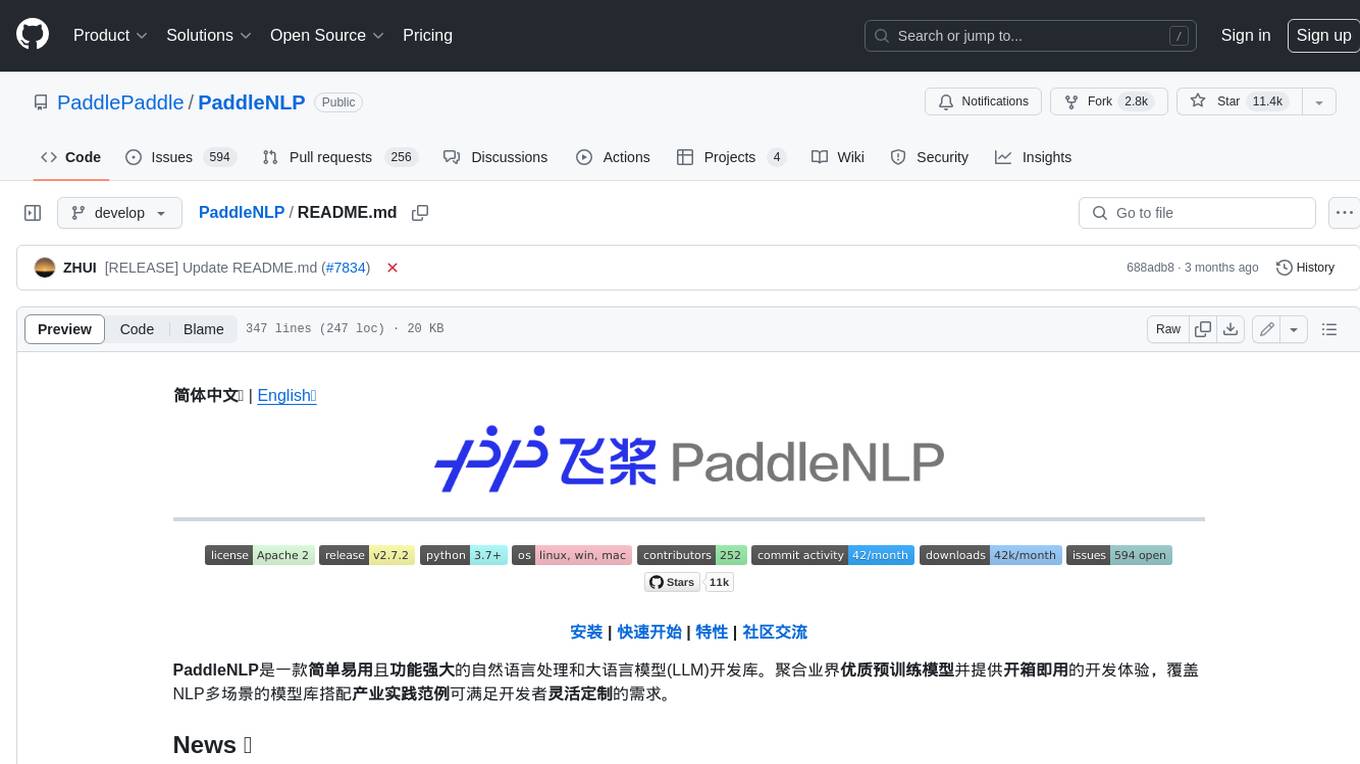
PaddleNLP
PaddleNLP is an easy-to-use and high-performance NLP library. It aggregates high-quality pre-trained models in the industry and provides out-of-the-box development experience, covering a model library for multiple NLP scenarios with industry practice examples to meet developers' flexible customization needs.
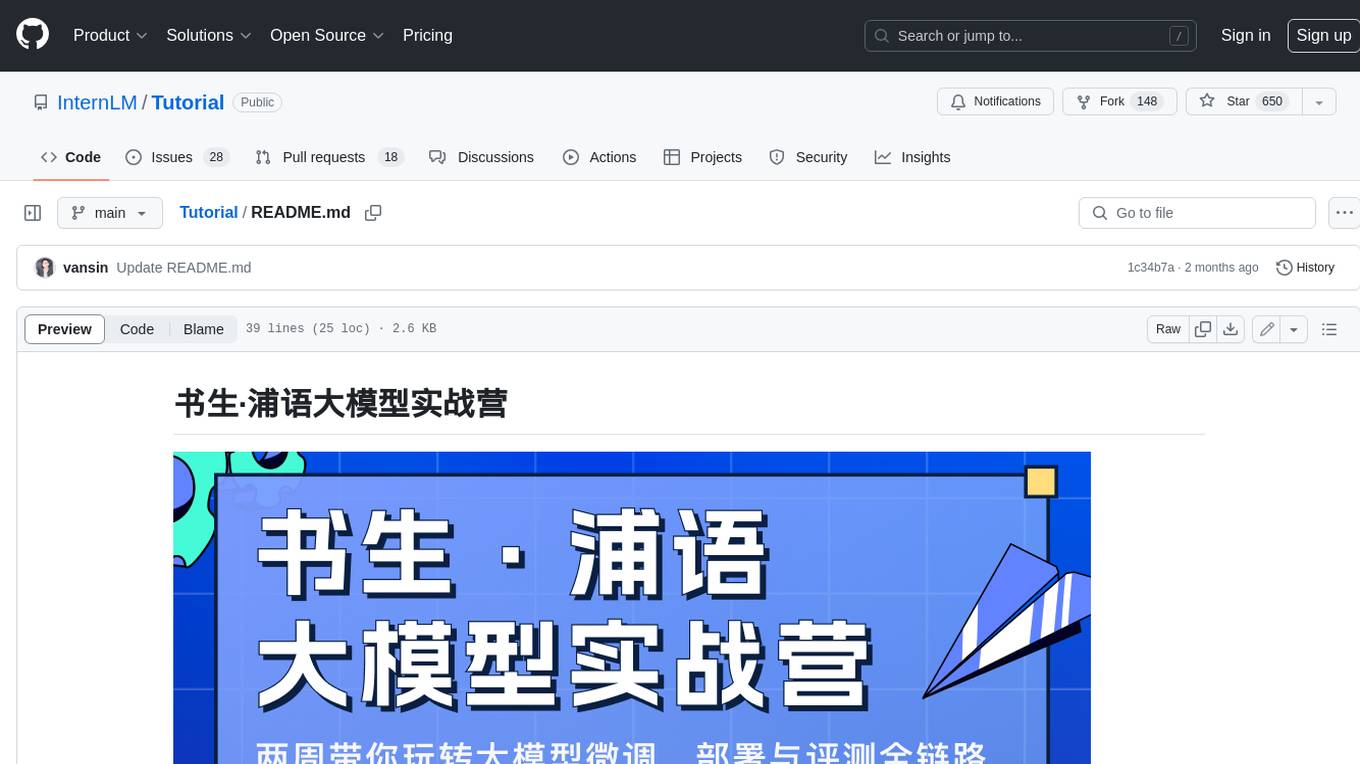
Tutorial
The Bookworm·Puyu large model training camp aims to promote the implementation of large models in more industries and provide developers with a more efficient platform for learning the development and application of large models. Within two weeks, you will learn the entire process of fine-tuning, deploying, and evaluating large models.
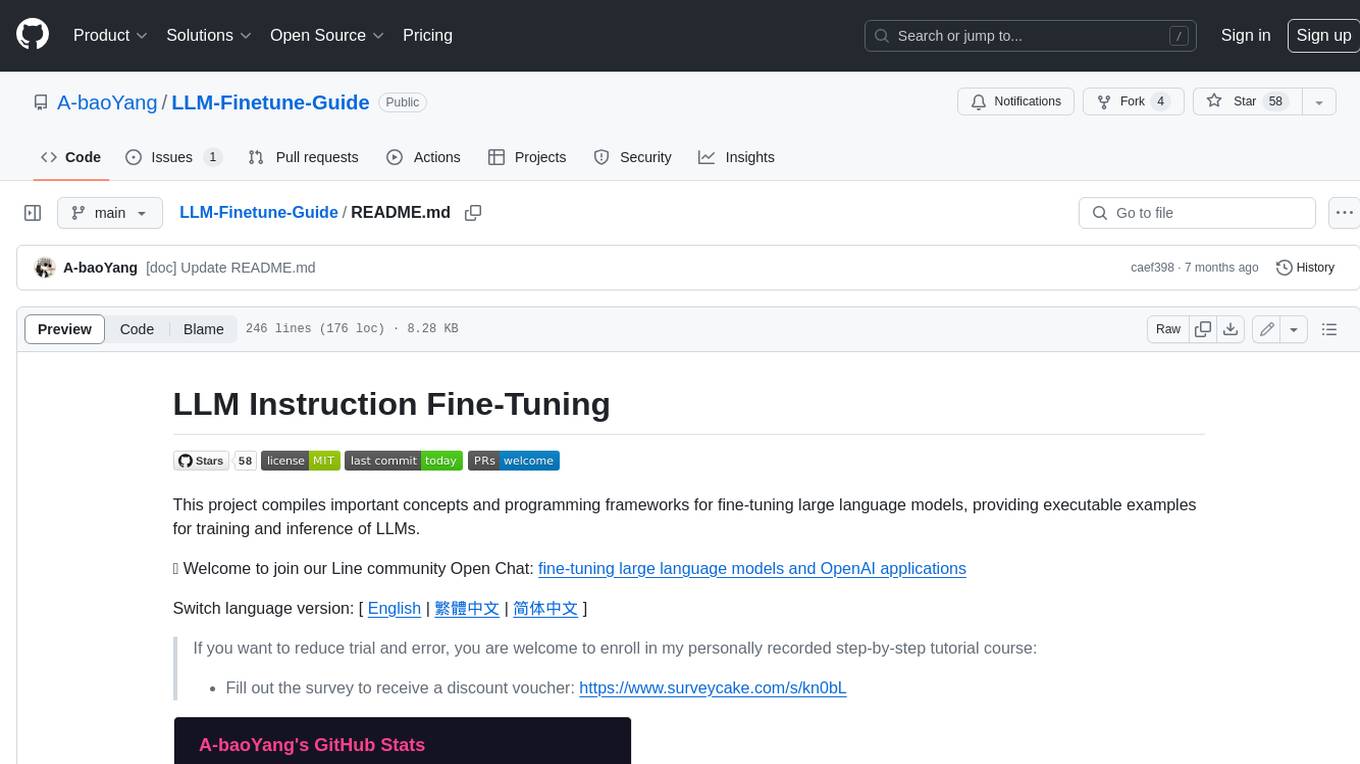
LLM-Finetune-Guide
This project provides a comprehensive guide to fine-tuning large language models (LLMs) with efficient methods like LoRA and P-tuning V2. It includes detailed instructions, code examples, and performance benchmarks for various LLMs and fine-tuning techniques. The guide also covers data preparation, evaluation, prediction, and running inference on CPU environments. By leveraging this guide, users can effectively fine-tune LLMs for specific tasks and applications.
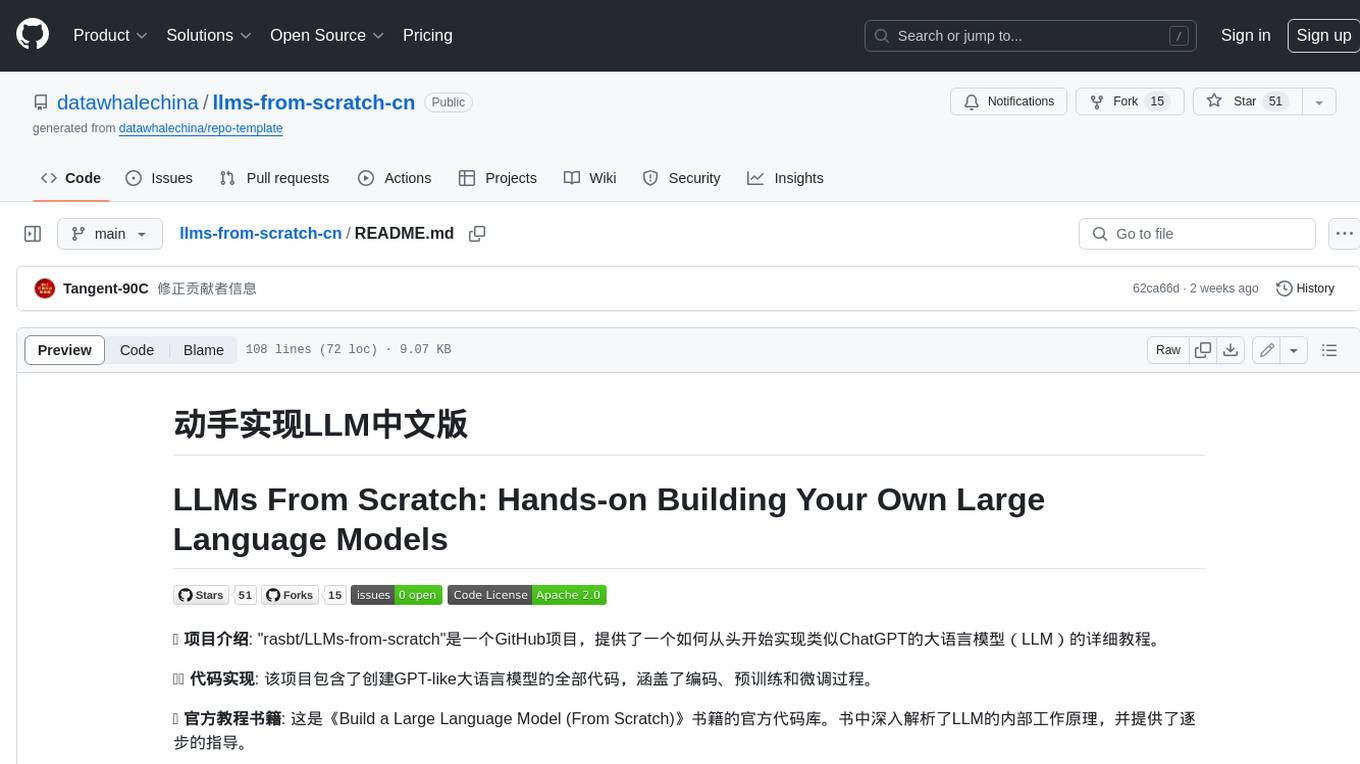
llms-from-scratch-cn
This repository provides a detailed tutorial on how to build your own large language model (LLM) from scratch. It includes all the code necessary to create a GPT-like LLM, covering the encoding, pre-training, and fine-tuning processes. The tutorial is written in a clear and concise style, with plenty of examples and illustrations to help you understand the concepts involved. It is suitable for developers and researchers with some programming experience who are interested in learning more about LLMs and how to build them.
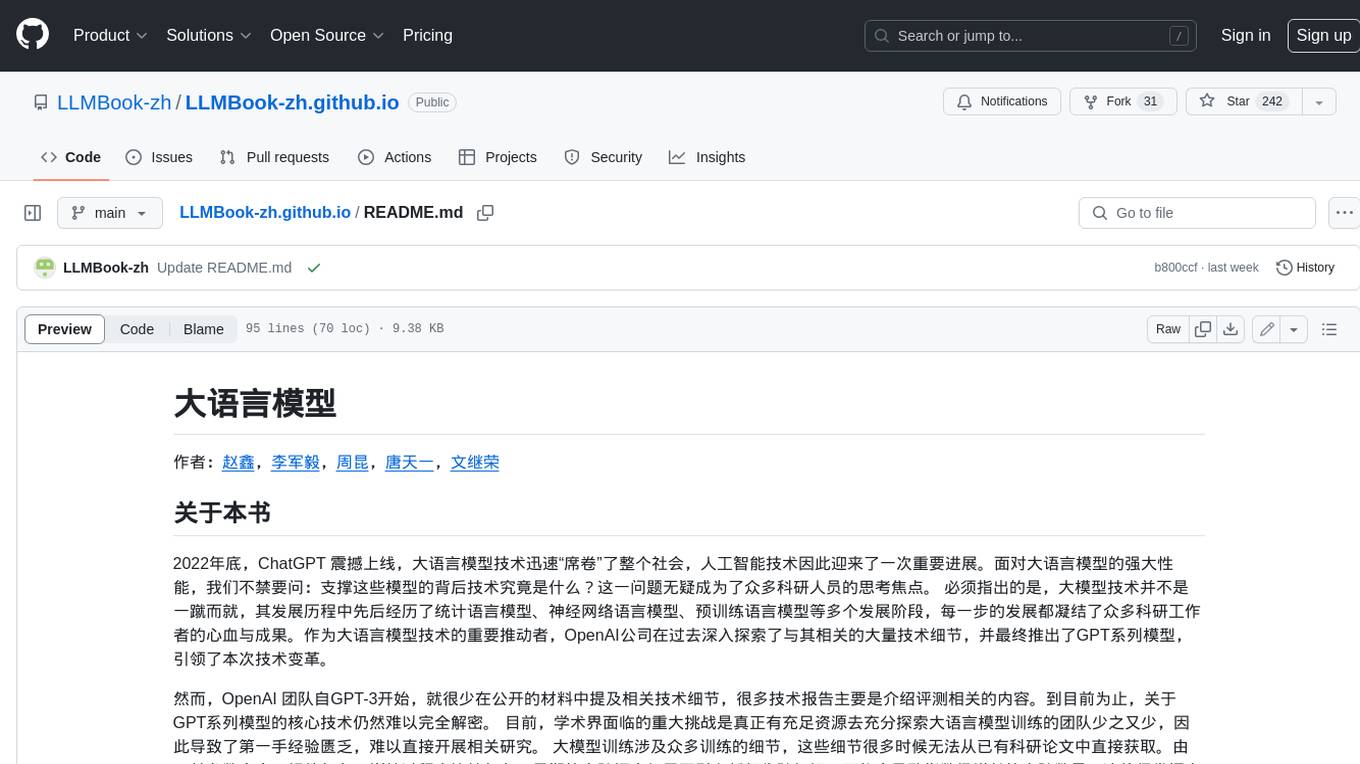
LLMBook-zh.github.io
This book aims to provide readers with a comprehensive understanding of large language model technology, including its basic principles, key technologies, and application prospects. Through in-depth research and practice, we can continuously explore and improve large language model technology, and contribute to the development of the field of artificial intelligence.
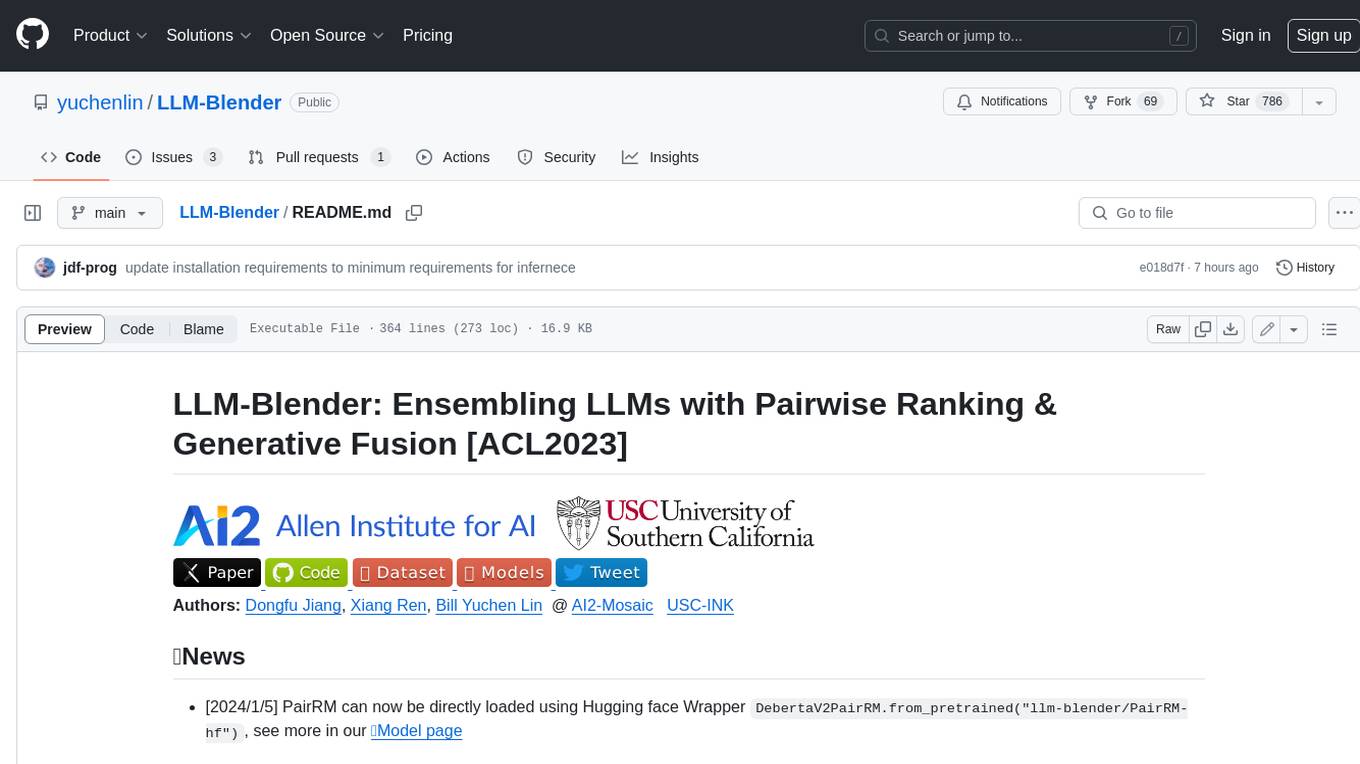
LLM-Blender
LLM-Blender is a framework for ensembling large language models (LLMs) to achieve superior performance. It consists of two modules: PairRanker and GenFuser. PairRanker uses pairwise comparisons to distinguish between candidate outputs, while GenFuser merges the top-ranked candidates to create an improved output. LLM-Blender has been shown to significantly surpass the best LLMs and baseline ensembling methods across various metrics on the MixInstruct benchmark dataset.
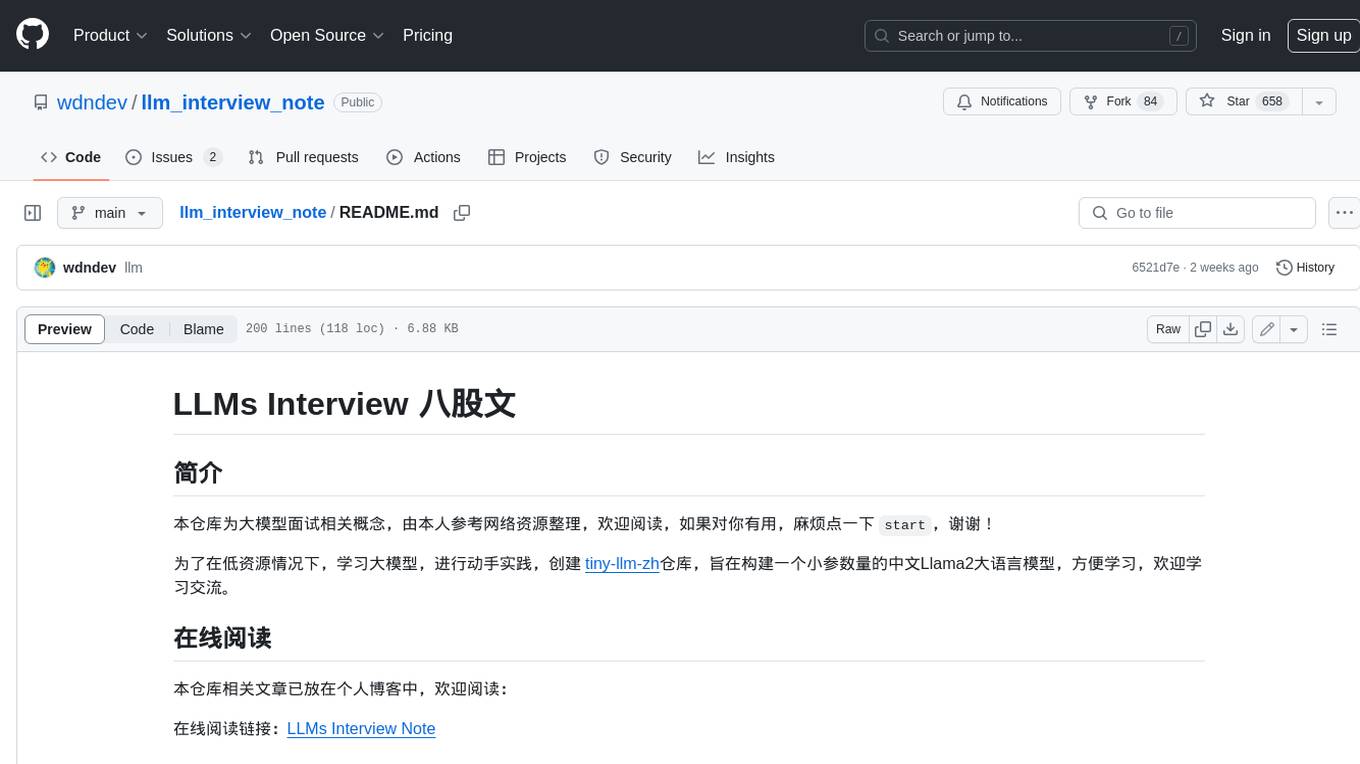
llm_interview_note
This repository provides a comprehensive overview of large language models (LLMs), covering various aspects such as their history, types, underlying architecture, training techniques, and applications. It includes detailed explanations of key concepts like Transformer models, distributed training, fine-tuning, and reinforcement learning. The repository also discusses the evaluation and limitations of LLMs, including the phenomenon of hallucinations. Additionally, it provides a list of related courses and references for further exploration.
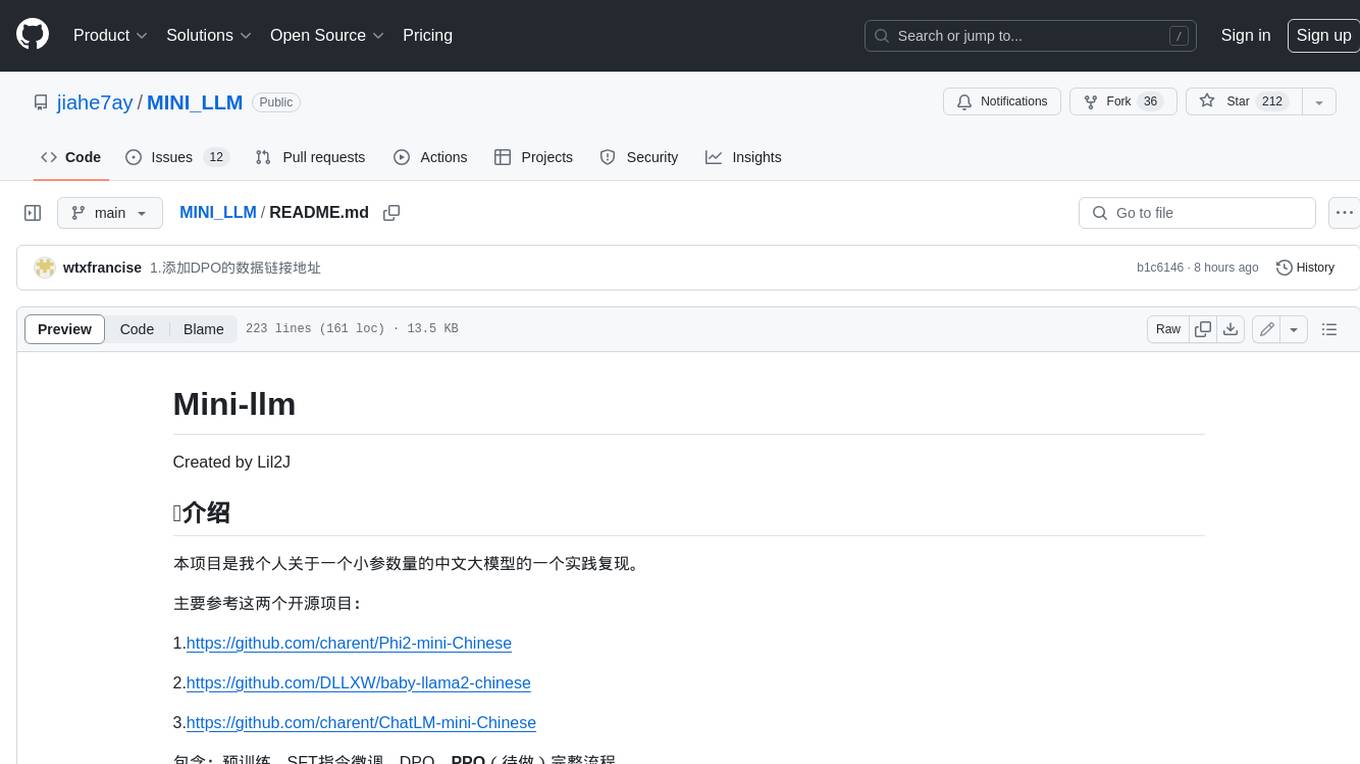
MINI_LLM
This project is a personal implementation and reproduction of a small-parameter Chinese LLM. It mainly refers to these two open source projects: https://github.com/charent/Phi2-mini-Chinese and https://github.com/DLLXW/baby-llama2-chinese. It includes the complete process of pre-training, SFT instruction fine-tuning, DPO, and PPO (to be done). I hope to share it with everyone and hope that everyone can work together to improve it!
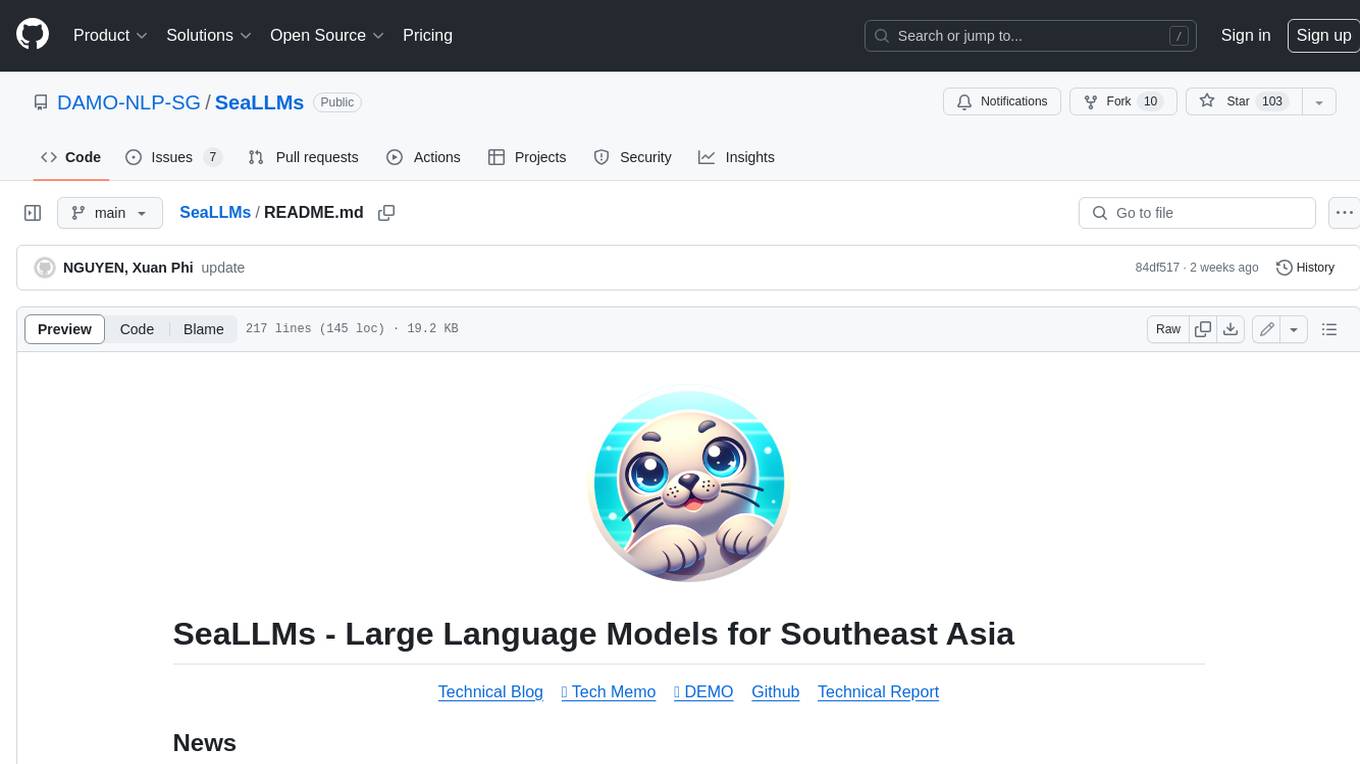
SeaLLMs
SeaLLMs are a family of language models optimized for Southeast Asian (SEA) languages. They were pre-trained from Llama-2, on a tailored publicly-available dataset, which comprises texts in Vietnamese 🇻🇳, Indonesian 🇮🇩, Thai 🇹🇭, Malay 🇲🇾, Khmer🇰🇭, Lao🇱🇦, Tagalog🇵🇭 and Burmese🇲🇲. The SeaLLM-chat underwent supervised finetuning (SFT) and specialized self-preferencing DPO using a mix of public instruction data and a small number of queries used by SEA language native speakers in natural settings, which **adapt to the local cultural norms, customs, styles and laws in these areas**. SeaLLM-13b models exhibit superior performance across a wide spectrum of linguistic tasks and assistant-style instruction-following capabilities relative to comparable open-source models. Moreover, they outperform **ChatGPT-3.5** in non-Latin languages, such as Thai, Khmer, Lao, and Burmese.

awesome-generative-information-retrieval
This repository contains a curated list of resources on generative information retrieval, including research papers, datasets, tools, and applications. Generative information retrieval is a subfield of information retrieval that uses generative models to generate new documents or passages of text that are relevant to a given query. This can be useful for a variety of tasks, such as question answering, summarization, and document generation. The resources in this repository are intended to help researchers and practitioners stay up-to-date on the latest advances in generative information retrieval.
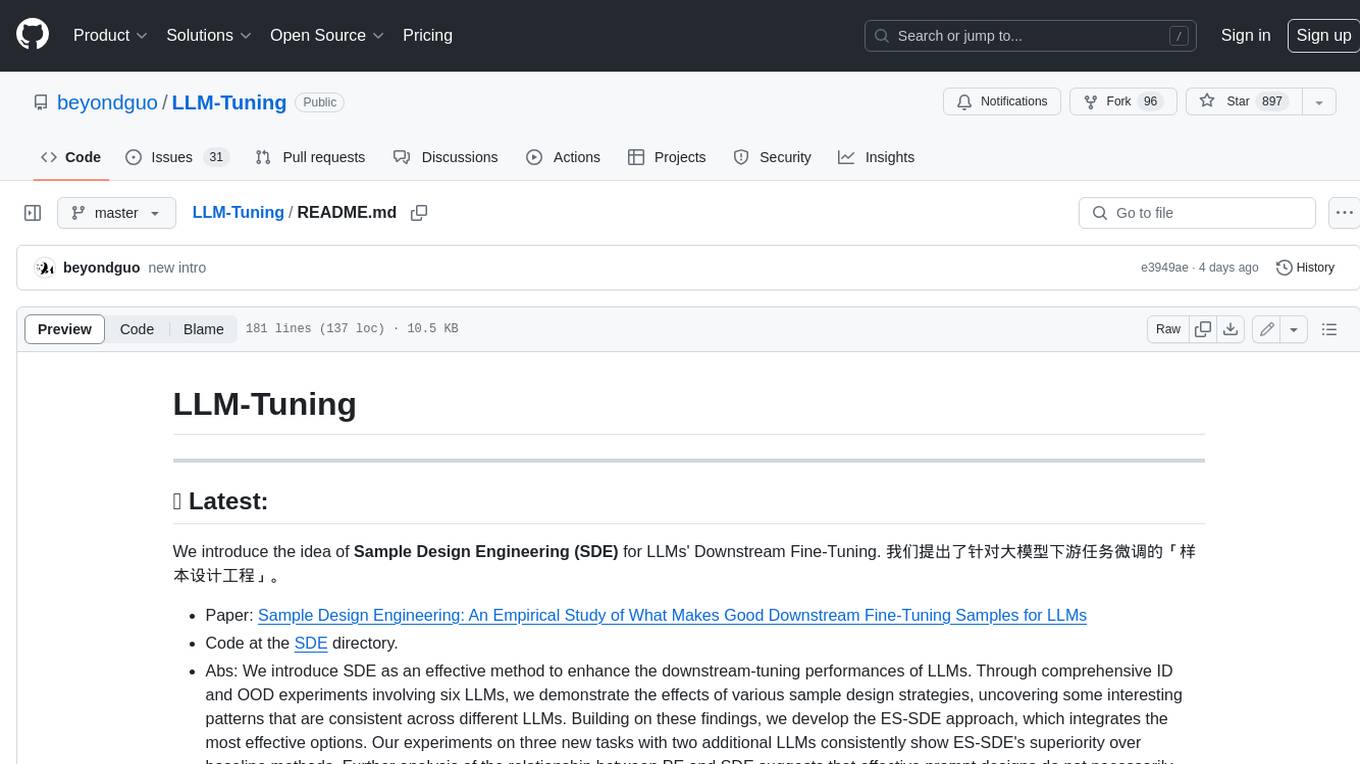
LLM-Tuning
LLM-Tuning is a collection of tools and resources for fine-tuning large language models (LLMs). It includes a library of pre-trained LoRA models, a set of tutorials and examples, and a community forum for discussion and support. LLM-Tuning makes it easy to fine-tune LLMs for a variety of tasks, including text classification, question answering, and dialogue generation. With LLM-Tuning, you can quickly and easily improve the performance of your LLMs on downstream tasks.
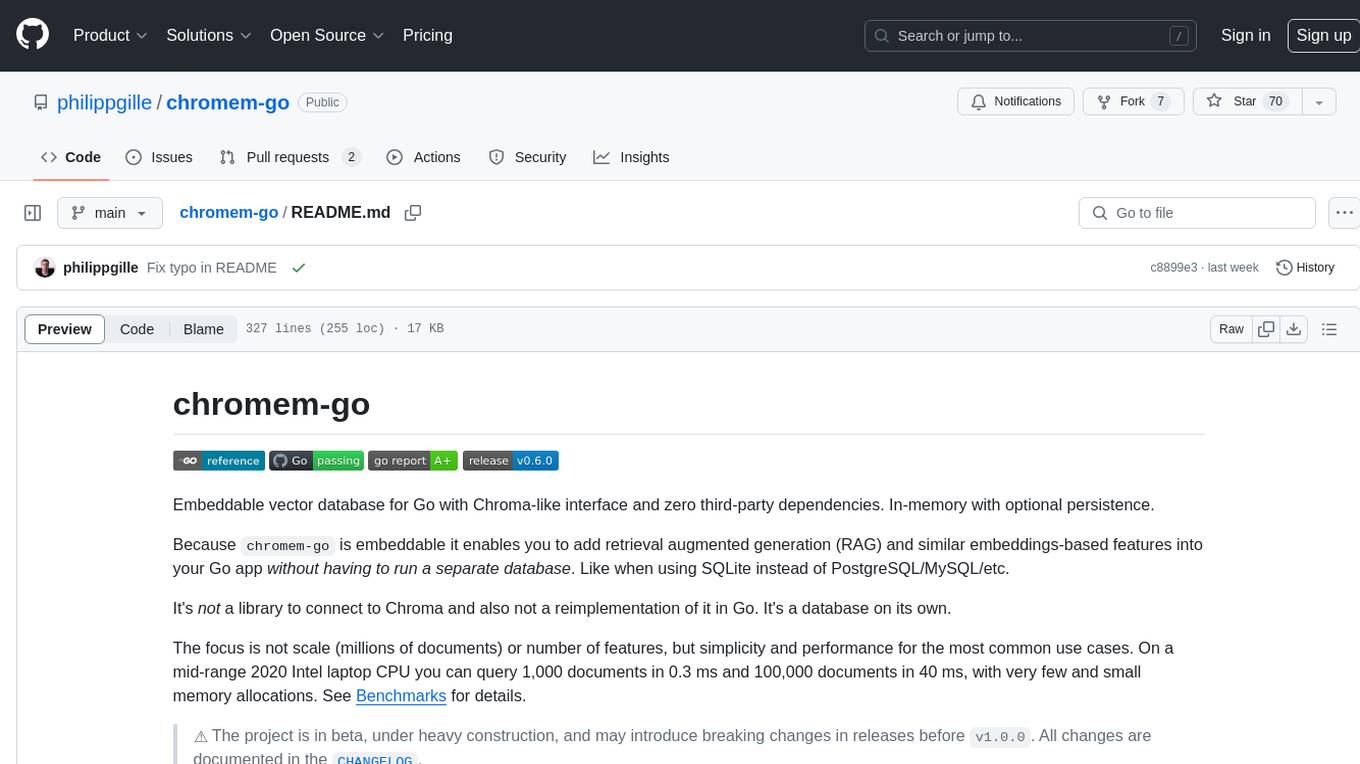
chromem-go
chromem-go is an embeddable vector database for Go with a Chroma-like interface and zero third-party dependencies. It enables retrieval augmented generation (RAG) and similar embeddings-based features in Go apps without the need for a separate database. The focus is on simplicity and performance for common use cases, allowing querying of documents with minimal memory allocations. The project is in beta and may introduce breaking changes before v1.0.0.
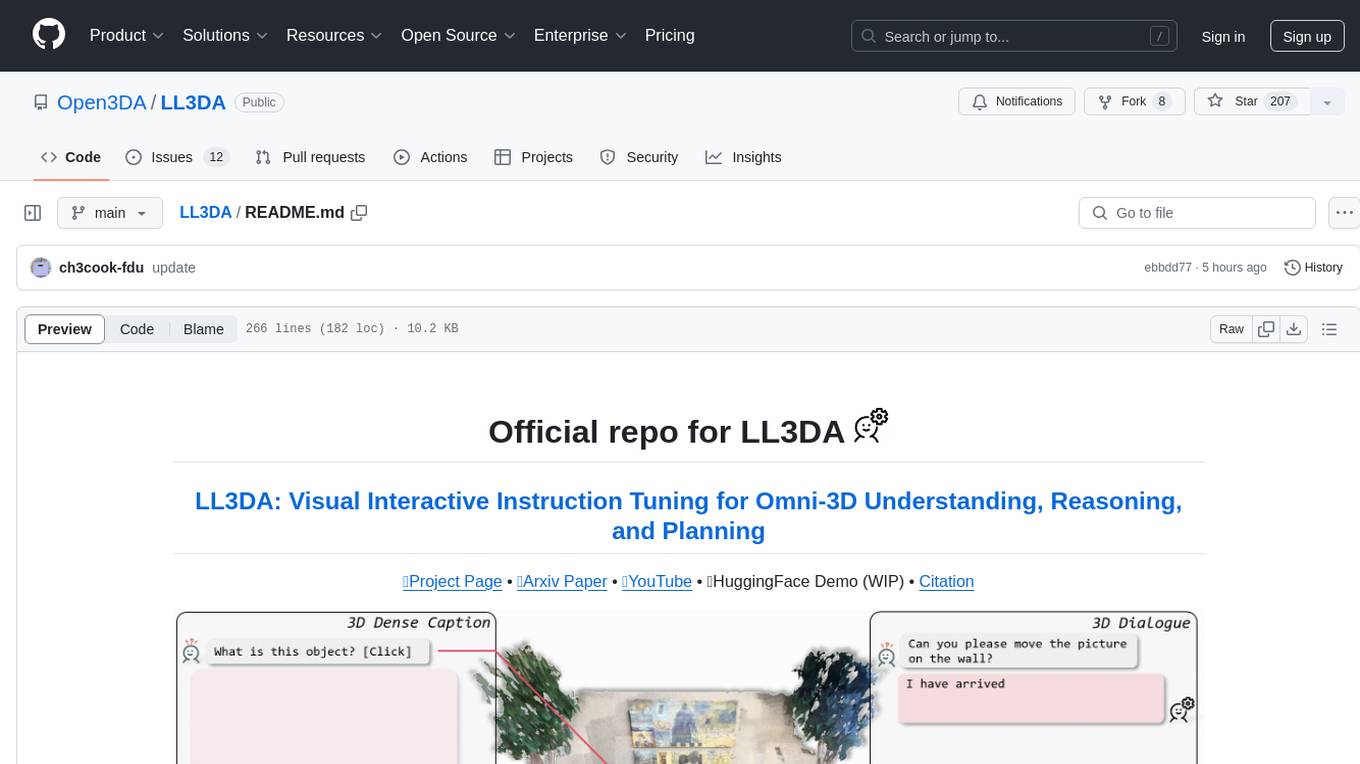
LL3DA
LL3DA is a Large Language 3D Assistant that responds to both visual and textual interactions within complex 3D environments. It aims to help Large Multimodal Models (LMM) comprehend, reason, and plan in diverse 3D scenes by directly taking point cloud input and responding to textual instructions and visual prompts. LL3DA achieves remarkable results in 3D Dense Captioning and 3D Question Answering, surpassing various 3D vision-language models. The code is fully released, allowing users to train customized models and work with pre-trained weights. The tool supports training with different LLM backends and provides scripts for tuning and evaluating models on various tasks.
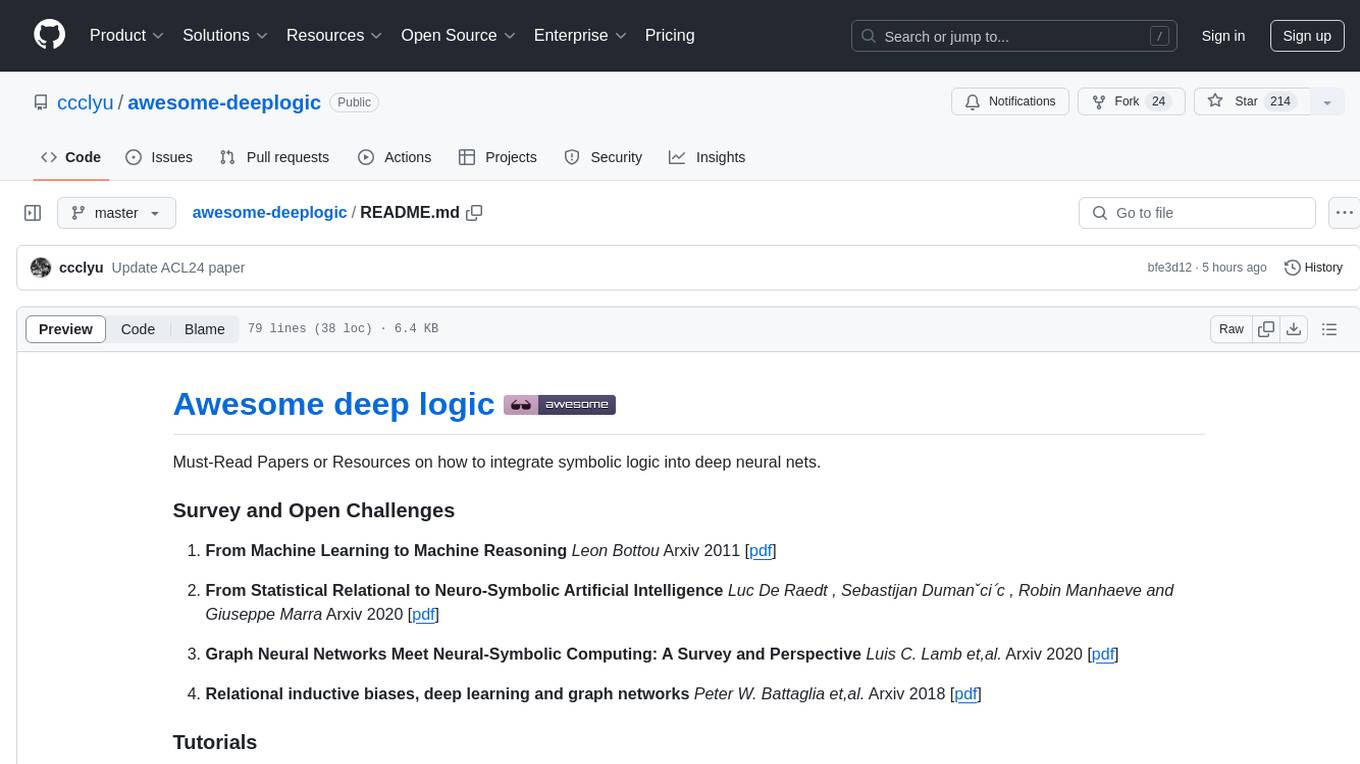
awesome-deeplogic
Awesome deep logic is a curated list of papers and resources focusing on integrating symbolic logic into deep neural networks. It includes surveys, tutorials, and research papers that explore the intersection of logic and deep learning. The repository aims to provide valuable insights and knowledge on how logic can be used to enhance reasoning, knowledge regularization, weak supervision, and explainability in neural networks.
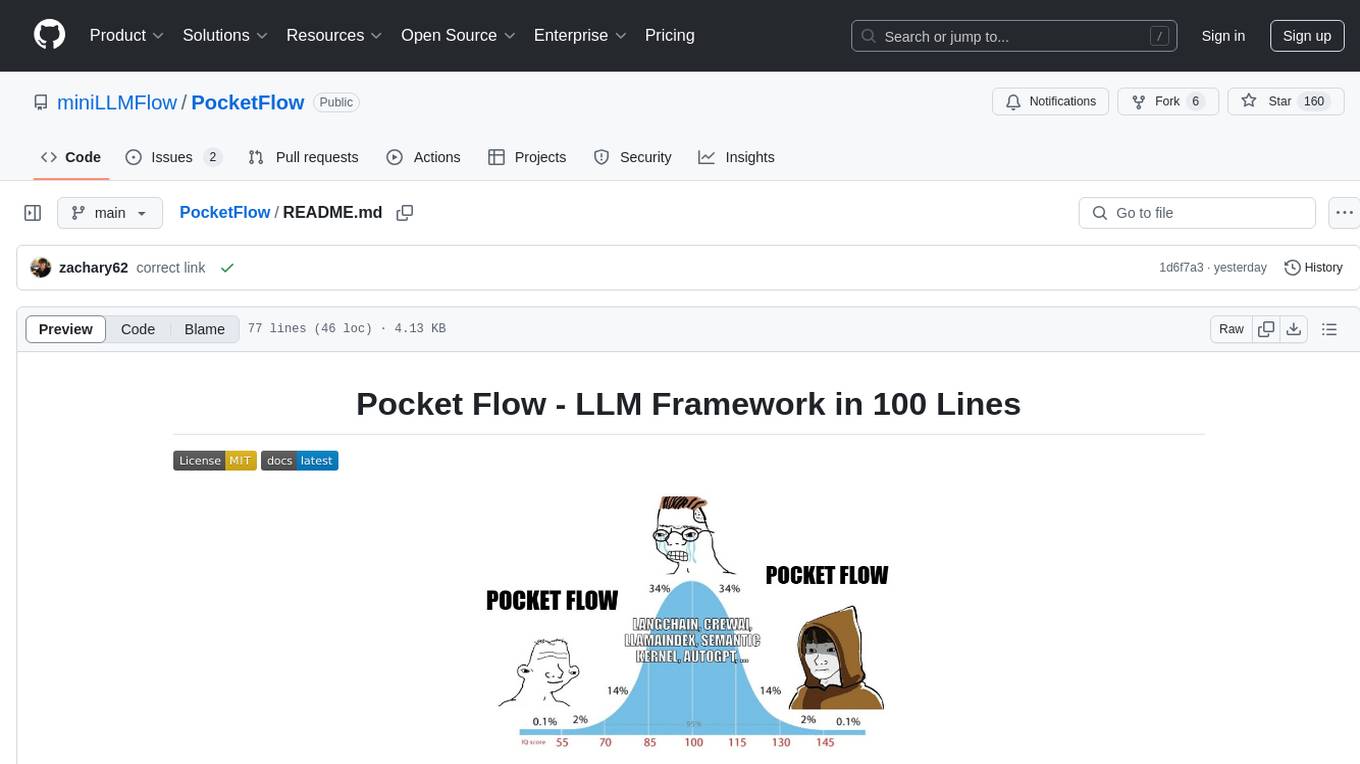
PocketFlow
Pocket Flow is a 100-line minimalist LLM framework designed for (Multi-)Agents, Task Decomposition, RAG, etc. It aims to be the framework used by LLMs, focusing on stripping away low-level implementation details and emphasizing high-level programming paradigms. Pocket Flow serves as a learning resource and provides a core abstraction of a nested directed graph for breaking down tasks into multiple steps.
20 - OpenAI Gpts
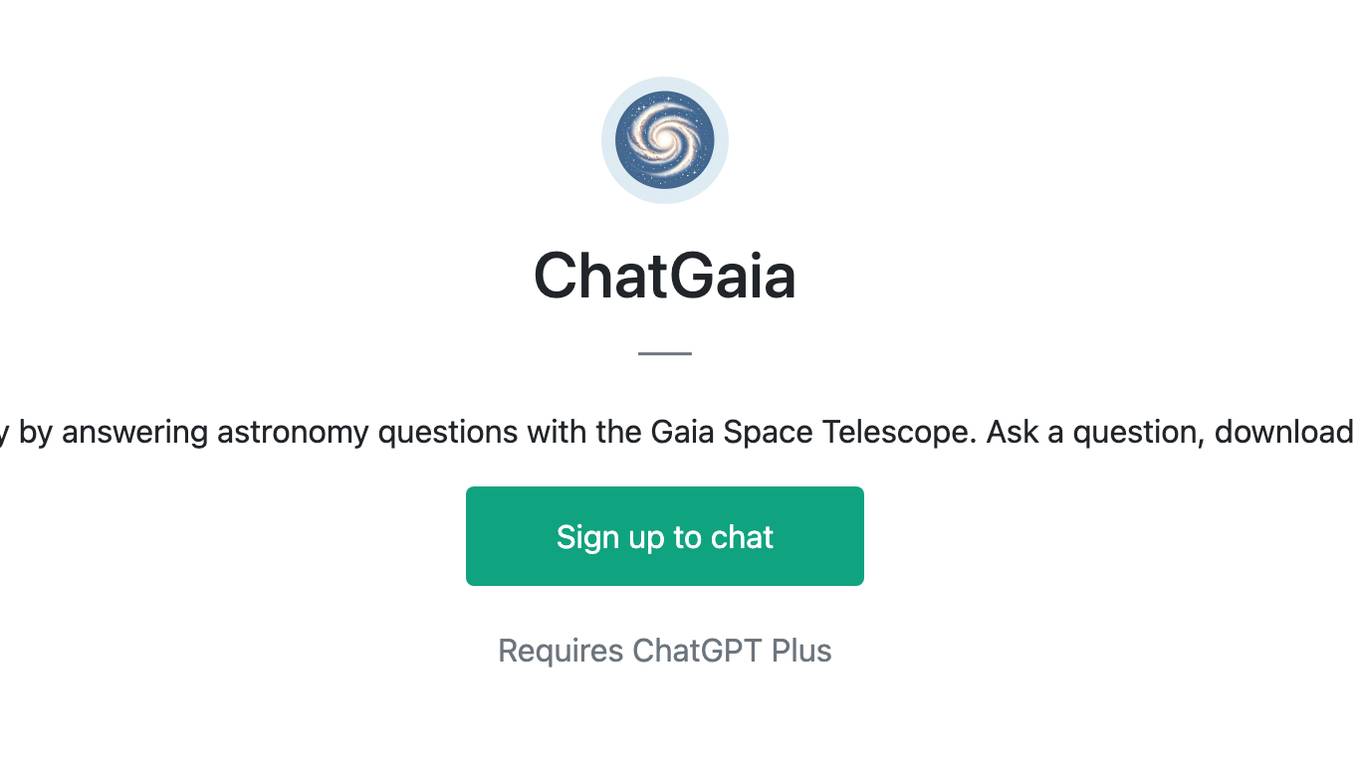
ChatGaia
I help you to explore the galaxy by answering astronomy questions with the Gaia Space Telescope. Ask a question, download .csv, upload .csv for plotting
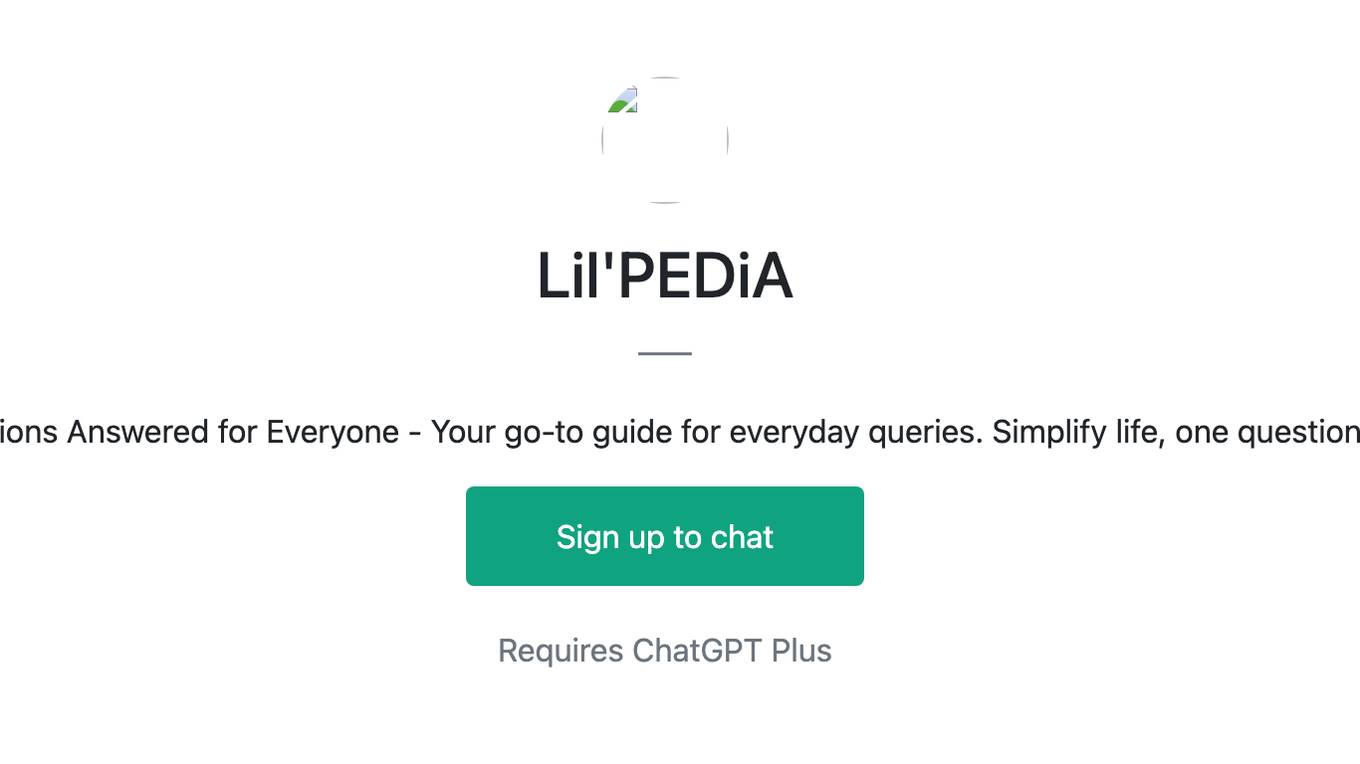
Lil'PEDiA
Basic Questions Answered for Everyone - Your go-to guide for everyday queries. Simplify life, one question at a time!
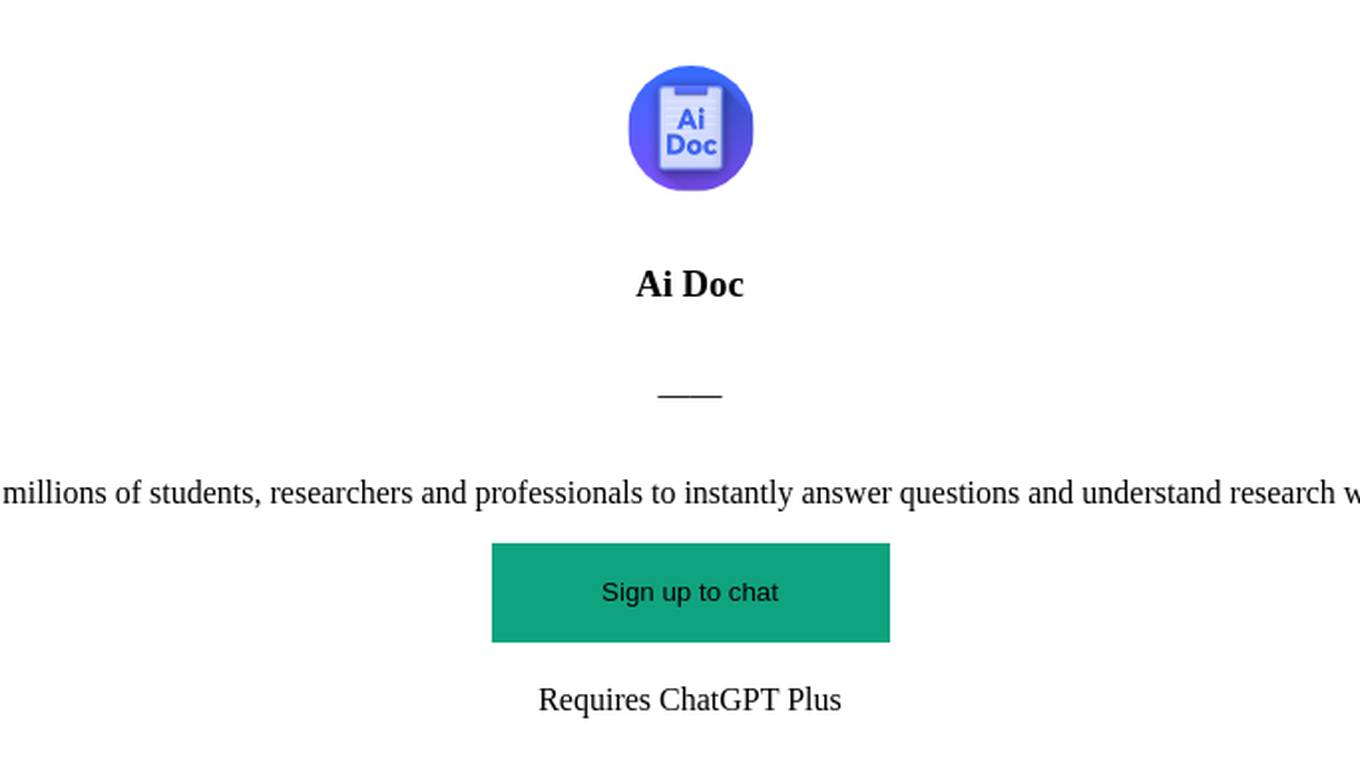
Ai Doc
Join millions of students, researchers and professionals to instantly answer questions and understand research with Al
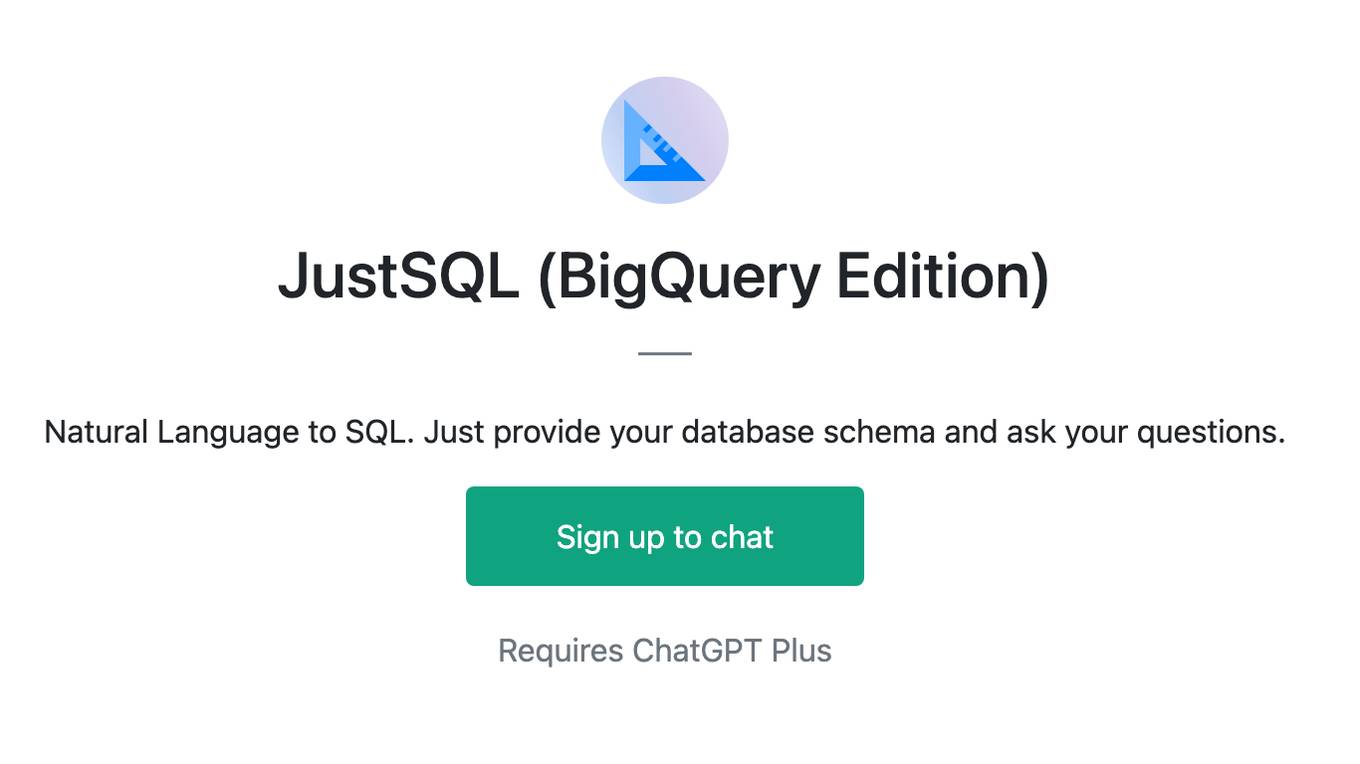
JustSQL (BigQuery Edition)
Natural Language to SQL. Just provide your database schema and ask your questions.
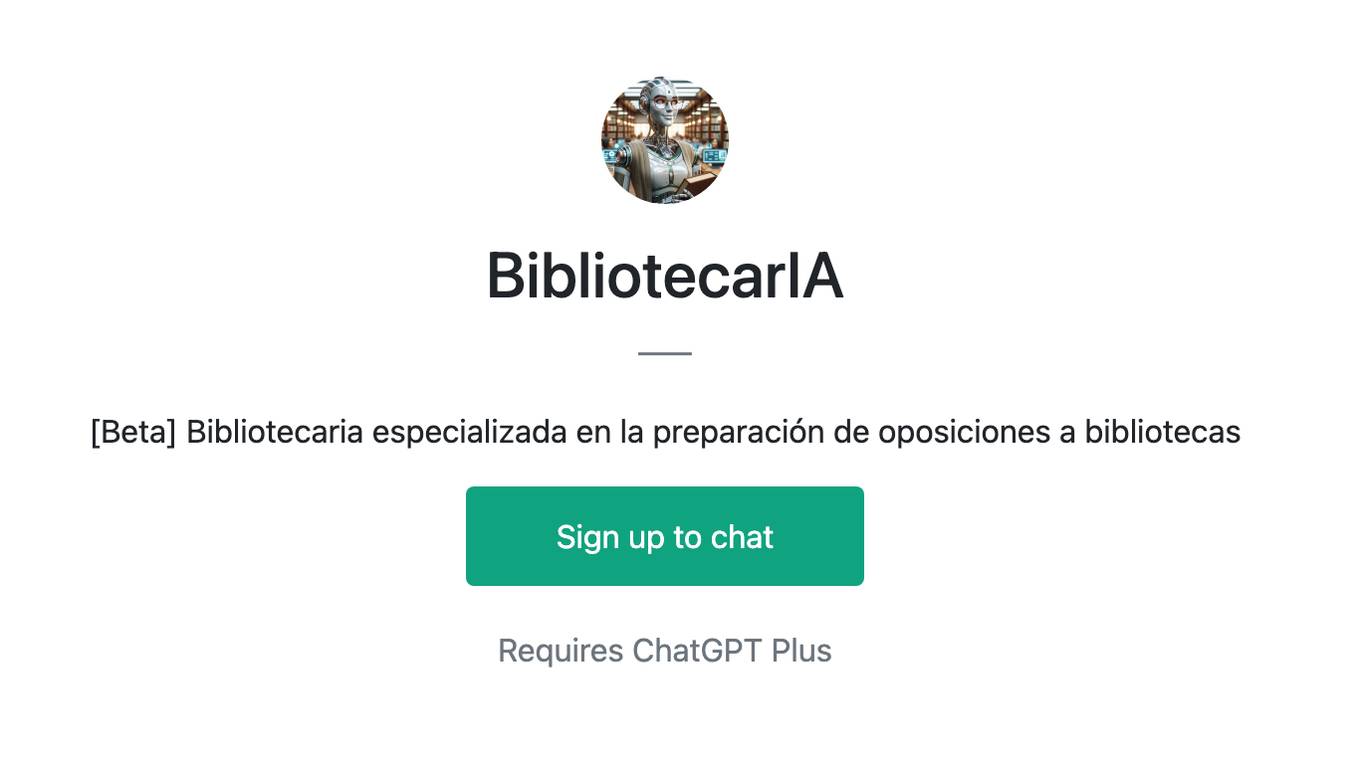
BibliotecarIA
[Beta] Bibliotecaria especializada en la preparación de oposiciones a bibliotecas
